In this section you have the opportunity to read and listen to EIT students talking about the reality of the programs. Discussions are wide-ranging and include information about the study commitment required, the value of the qualification in their careers, the relevance of the subject matter, future pathways, and more. They provide valuable feedback for you to take into account before you decide to join one of our programs.
An accomplished Controls Technical Field Advisor, Leticia Oppong is a recent graduate of EIT's Professional Certificate in Programmable Logic Controllers (PLCs) & SCADA Systems. As technology and software in the PLC and SCADA industrial world has developed over time, the need for ongoing education in the sector is necessary. Leticia enrolled with EIT to broaden her expertise in the field and ensure she stays on top of industry developments.
A self-proclaimed natural problem solver, Leticia's journey towards her engineering career began after graduating high school when she enrolled in Electrical Engineering at the Kwame Nkrumah University of Science and Technology.
"I've always had a knack for fixing broken things. I was the child who tore electronics apart and put them together. So, pursuing engineering was a natural progression." Leticia said.
"I've continued in the field because I enjoy navigating the complex systems, with the ultimate purpose of solving problems."
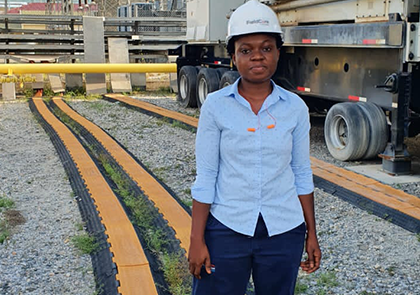
Shortly after graduating, Leticia undertook internships at Vodafone Ghana and General Electric (GE). After completing her internship experience in 2014, Leticia was offered a Controls Engineer position within GE, and in 2017 she accepted a position at FieldCore.
A GE company, FieldCore, is a global industrial field services company that Leticia is still working for today. With the experience she gained over the years, she was able to familiarize herself with power generation technologies. However, she notes that there is increasing development inside the industry.
She points to digital twin technology as a fascinating development in the industry. Digital twin technology is a virtual model of a process, product, or service. Utilizing this technology, Leticia says, helps with predictive maintenance.
"Being able to create a virtual model of a gas turbine to forecast performance issues in time for corrective action, optimizing operations, and having visibility of when a unit needs maintenance is pretty fascinating to me," Leticia said.
As a field engineer, Leticia works on different projects over a period of time, so the daily responsibilities aren't always fixed. There may always be something new to do. However, she is familiar with gas turbines and their control systems - and those are the constants in her work.
"I'm typically responsible for the installation, maintenance, and operation of the gas turbine's control system. For a new unit, that would include calibration of all instrumentation, panel setup, logic verification, and systems commissioning. For unit maintenance, there's still instrument calibration & inspections, part replacement, and returning the unit back online. And in operations, my job would be to support the customer in keeping things running smoothly: unit monitoring, fault-finding, and issue resolution," she explains.
PLCs and SCADA systems in the industrial world help with the overall control of the industrial system. Mastering the machinery is important for engineers and engineering practitioners. With added automation technologies making the systems more complex but increasingly more efficient, engineers are beginning to face a learning curve.
"Throughout my career, I have worked with a particular control system, albeit with some variation. This year, I decided I wanted to expand my portfolio. After some consultation, a course in PLC and SCADA emerged as the best option to get that foundation I needed to broaden my expertise. Due to my work schedule, attending an in-person class was not on the table, so I started looking for online options. A colleague mentioned EIT, where he had taken a master's some years earlier. So, I went to the website and got enrolled," Leticia said.
Now that she has graduated, Leticia doesn't intend on slowing down whatsoever. "I intend to remain in the engineering space, honing my skill set and ultimately taking on roles in project engineering and plant management," she concluded.
We wish Leticia well in her ongoing engineering career and are immensely proud to have her as one of our alumni.
Ray Crawshaw is an engineer who currently works in the mining industry in Australia. He is also an Engineering Institute of Technology (EIT) alumnus, having studied our 52726WA - Advanced Diploma of Applied Electrical Engineering and our Master of Engineering (Industrial Automation).
Ray has spent his working life pursuing more practical and hands-on jobs and has filled a plethora of roles in several countries and regions. He truly has had a decorated career, with 35 years of experience in the oil & gas, power generation, and mining sectors. Later on in his career, Ray looked to add higher education qualifications to his resume, further building upon his skills and technical knowledge. Nearing retirement age is not slowing Ray down — he is more determined and hungry for growth in his academic and working career than ever before.
A son of a farmer, Ray went to school in a country farming region in New Zealand. When he was 11 years old, his father tragically passed. In 1966, he started living on his uncle’s farm. His uncle encouraged him to take up a trade so that he could find work.
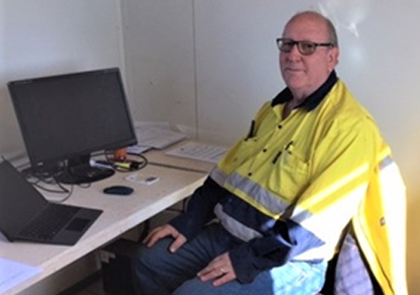
Ray applied for a job as an electrician and was soon employed by a power supply authority in New Zealand. He started as a substation cadet. Ray ended up spending eight years with the Bay of Islands Electric Power Trust (now known as Top Energy). There, he earned a trade certificate in the first two years of his four-year apprenticeship. He still, however, had to complete the 8,000 required hours.
In 1978, Ray moved to Australia for work, which saw him fulfilling an altogether different role. He became a fireman on a train that transported freshly cut sugarcane. A year later, he went back to New Zealand for Christmas and incidentally met his future wife.
Six months later, Ray was married and began working for New Zealand’s only oil refinery, Marsden Point Oil Refinery. Refining NZ, the company that operated the refinery, was spending several billions of dollars upgrading it. He spent two years on the refinery, saving money to buy a house for his family, which was soon to grow.
Back in his hometown, Ray decided to start a business that sold whiteware, such as fridges and stoves. His wife oversaw the operations of the store.
Ray began to do commercial and domestic contracting work. His industrial experience, however, took precedence and saw him constructing mills in the north of New Zealand. Along with a crew of 50, they ran the project from start to finish. Ray then returned to contracting himself out to dairy farmers and abattoirs.
Chasing the boom
Ray and his wife flew to Australia for Christmas in 2007. Looking for a change of scenery, they decided to pursue opportunities during Australia’s mining boom. He was soon working on the electrical systems on a plethora of mines in Australia.
Due to his years of experience, Ray was promoted to supervisor and superintendent roles on the mines. He then was head-hunted while working at one of the mines, which allowed Ray to pivot to the oil and gas industry. He became a construction area manager on Gorgon Barrow Island’s LNG (Liquefied Natural Gas) Plant for a company named Leighton Contractors Oil and Gas. It was the largest LNG plant in the world built at the time; 10,000 people were employed to work on the project, and it cost a total of 60 billion dollars (AUD). Ray was the area construction manager that laid four million kilometers of cable.
A year and a half later, Ray began work for ConocoPhillips — an American oil and gas company — on their Gladstone Curtis Island site in Queensland, Australia. He worked as a Programs Completion Manager working on their LNG project. Soon he was flown out to work on another project, this time for Chevron back at Barrow Island Gorgon.
There was no doubt at this point that Ray was an engineering professional in all sense of the word. However, Ray himself had an overwhelming feeling that he was missing that formalized ‘Professional Engineer’ recognition. He set out to find a way he could become a professional engineer while continuing to work.
The EIT connection
“Since leaving school, I hadn’t done any formal education for over nearly forty years. I just had the trade certificate. I had a lot of experience over the years, had run my own business, and had been in many high profile positions. But, I didn’t have any qualifications to back it up,” Ray said.
In the year that Ray began work on Gorgon Barrow Island in 2012, he enrolled in the 52726WA - Advanced Diploma of Applied Electrical Engineering with EIT, finishing it in the year 2014. Witnessing the encroachment of technology into the engineering disciplines he was interested in, he wondered if he should become more skilled in automation.
Ray had already worked for Chevron for a year when he enrolled in our Master of Engineering (Industrial Automation). He seamlessly integrated what he was doing at work into his thesis for EIT. He became the E&I area construction manager overseeing the construction and pre-commissioning of engineering equipment crucial to the LNG operations on those projects.
“At Chevron, they were testing the gas wells for mercury, and they thought they aligned with international standards, but by the time it got to the plant itself, the mercury levels were a lot higher than the standards,” Ray explained. As a construction manager, he was given the task to go into the plant and install online mercury analyzing equipment. The master’s studies came into good use — Ray found he could consolidate what he was learning in his automation studies to find a more efficient way of detecting mercury levels.
“I thought there must have been a better, less expensive way of testing mercury levels. Using modern technology, I looked into what we could devise that could help us analyze. We ended up using electric devices that would use surface acoustic waves for measuring mercury. And since the master’s with EIT was to do with automation and control, I had to use my knowledge of PLCs and SCADA and HMI. So I correlated the thesis with the work I was doing there.”
Beginning the golden years
Ray entered his sixties in 2017 and was as hungry as ever to continue working in the world of engineering. After he finished at Chevron, he found it was harder and harder to get work — he couldn’t find a job for ten months. As a consequence, he began looking for work overseas, hoping a company might see the benefit of his immense experience.
He managed to snag a job as an LNG plant commissioning manager in San Antonio, Texas, in the United States for a company named BHGE. The job saw him being ported to Port Harcourt in Nigeria as well — a region that was going through a civil war at the time. After a year and a month of working in that role, he moved back to Australia.
In Western Australia, Ray found work again. This time as a project manager for Synergy, Western Australia’s leading provider of electricity and gas. He oversaw projects at the Mungarra Gas Turbine Power Station and the building of Black Start generator for a GE Gas Turbine that supplied the Western Power grid. He was highly lauded in the position and given an award for delivering it on time and under budget.
Ray is currently working at Fortescue Metals Group Mine, a global leader in the iron ore industry. He is working as a construction and commissioning manager on-site, building mining hoppers and shifting them from location to location. He is on-site for three weeks at a time as he is employed on a FIFO (fly-in, fly-out) basis. Ray’s contribution to the engineering world has been invaluable.
“Considering my age, the two qualifications I received through EIT did enhance my career in terms of positions and employment — not only in Australia, but overseas as well. I recommend for anyone to do qualifications with EIT because the online delivery mode is utterly convenient,” Ray said.
“Now, with EIT offering a doctorate, I might consider doing it. I will be nearly seventy by the time I finish,” he laughed. “But it would be worth it.”
Phillippus Roedolf (Rudy) Botha is the Managing Director of Victory Business Ventures — a family-owned construction company. He is also an Engineering Institute of Technology alumnus, having completed our 52724WA - Advanced Diploma of Civil and Structural Engineering in 2020. With his career trajectory in mind, Rudy has been working to both gain theoretical knowledge and hands-on practical work experience to achieve more sophisticated and management roles within industry.
Rudy achieved his Matric Certificate at Southdowns College in 2013. Unsure of the career path he wanted to follow, he decided to take a gap year in 2014. The year after that, he enrolled in Damelin College, to study a Diploma in Civil Engineering. Rudy had zeroed in on his newfound passion.
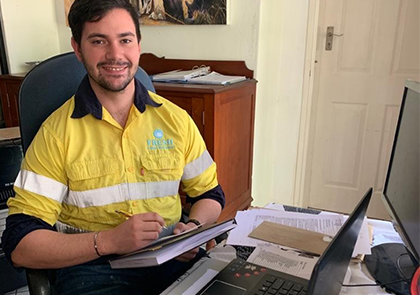
"I have always been fascinated with the structural features of buildings and the manner in which they are created. I have always felt a passion to be able to create buildings and structures of my own that will stand as reminders of my achievements in this industry," Rudy explains.
In 2017, he began working for Kalcon (WBHO) in Botswana at Karowe Mine as a student engineer, where his primary role was quality assurance with regards to civil works. In the middle of the year, Rudy went back to Damelin to rewrite two subjects, which finally earned him his Diploma in Civil Engineering.
At the end of 2017, the Karowe Mine project ended, leaving Rudy to search for a new engineering role. He had his sights set on DRA Global. The company is a multi-disciplinary global engineering group delivering mining, mineral processing, energy, agriculture, water treatment, and infrastructure services from concept, to commissioning and comprehensive operations and maintenance services. He applied to the company and was employed soon after.
He began working for DRA Global at Bisie Tin Mine in the Democratic Republic of Congo as a Junior Site Supervisor. His role was to supervise the contractors doing civil and earthworks.
"While I was with DRA Global, they mentioned an opportunity to work in a management role at the head office if I furthered my studies," Rudy explained.
"I decided that I wanted to advance my studies in the engineering industry while providing myself with better working opportunities." Consequently, he set out to begin developing his skill set and gain new insights into the management of civil engineering projects. He registered with the Engineering Institute of Technology at the start of 2018, and began earning his 52724WA - Advanced Diploma of Civil and Structural Engineering.
At the end of 2018, the civil and earthworks department was nearing completion at Bisie Tin Mine. Even though Rudy’s future with DRA Global looked promising, he saw potential in the family business in Botswana. In 2019, he decided to take over his father’s construction company in Botswana. He was also approached by Fresh Camp Services to take the role of Construction Manager in where they constructed flatpack units at the Khoemacau Mine in Botswana. He agreed to the project and worked with Fresh Camp Services under the family business until the contract came to an end in April 2020.
Now working with his family's business, Rudy is in charge of tendering for various new construction projects. He also has a role in the planning, costing, and management of the projects his company is involved in. Rudy notes that one of the most fascinating developments in the civil engineering industry has been the updating of design software that has made the entire construction process more efficient.
In Rudy's mind, the future's looking bright. He is an engineering professional who has taken charge of the development of both his qualifications and his work experience. He has boots-on-the-ground since finding his passion for the construction industry. He continues to find ways of innovating in the industry and ensuring the family company keeps finding success.
"I see my company taking on various new projects and leading the construction industry in Botswana, while being open to other international opportunities that may arise. I am looking to study further in order to obtain a Bachelor of Science (Civil and Structural Engineering), which will once again diversify the job opportunities that are available to me and my company," Rudy concluded.
When engineering equipment fails, the consequences can be severe or even catastrophic. Jan Croucamp has dedicated his career to ensuring the ongoing integrity and reliability of plants and equipment in the engineering services industry. He is a highly credentialed professional in the inspection engineering field in South Africa.
While maintaining his employment, Jan recently completed EIT’s 52810WA - Advanced Diploma of Mechanical Engineering to formalize his 17 years of practical experience. He advocates for the importance of supplementing applied learning with theoretical knowledge in carving out a long term career in industry. He says he chose the course because it was most in line with the industry he is working in.
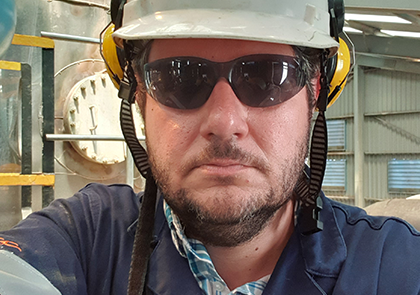
“This course gave me in-depth theoretical knowledge to my already in-depth practical knowledge — so it rounded me off nicely. The fact that it was online means you can work and still study no matter where you are. I literally studied in three different countries and did not struggle with any of my classes. The help and support you receive from the Learning Support Officers is life-saving.”
Jan has a wealth of practical experience in the industry. Still, he has been seeking opportunities to equip himself with the necessary knowledge to meet the challenges and demands of inspection engineering as the fourth industrial revolution continues to transform the profession.
“In this industry, sometimes certification outweighs qualification. Of course, you need to have some type of qualification to gain certification, but mainly, it is all to do with years of experience. I’m certified by the American Petroleum Institute, the International Institute of Welding, and the South African Institute of Welding,” Jan explains.
Jan remains passionate about the industry, even after 17 years of hard work. During that time, he has worked in the asset integrity field, performing inspections on pressure vessels, piping, storage tanks, and lifting equipment on refineries and chemical process plants. In almost two decades, he has learned the tools of the trade through a balanced approach of education and practical experience.
“There is always a problem to solve or damaged equipment to fix, and only engineering gives the solutions to these problems,” he says.
His daily responsibilities include evaluating NDT findings and identifying NDT methods. He also issues recommendations on items that need to be repaired and follows repair jobs from start to finish. He finds damaged mechanisms on equipment and evaluates the effect the damage has on the entire system. Moreover, depending on where he is in the world, he has to apply different kinds of inspection standards.
“A typical day will consist of verifying NDT reports, inspect equipment for damages, and following up repairs on pressurized equipment. I also work closely with engineering staff regarding the manufacturing and design parameters of pressurized equipment.
“Depending on the country you work in, you have to follow that country’s regulations on pressurized equipment. Most of the time, this gives you, the certified inspector, the right to keep equipment in service or remove it from service — if you feel it might put the public or employees’ lives in danger. It is an exciting job with a lot of responsibility that can cause you to be arrested if you miss something, and someone is injured due to your negligence.”
“The most fascinating developments in the industry are the remote inspection techniques that are now prevalent.”
He explains that new welding techniques have also arrived. Therefore, ongoing professional development is necessary to stay abreast of the changes that technology brings to the industry. His advanced diploma has served him well in that respect.
Jan explains he now finds himself at a crossroads and is pondering on what he should do next educationally. He is considering pursuing his Bachelor of Science in Mechanical Engineering. In the near future, he says he sees himself filling a technical manager or inspection manager role. Whatever he does end up doing, he wants to pass the torch on to the next generation, and influence them to take a step towards their engineering goals.
“I would encourage young people to pursue a job in STEM fields. STEM industries are the future and will be key industries that can sustain career growth.”
Lilongeni Gurney Geiseb is a Process Automation and Instrumentation Specialist. He has a pair of qualifications from the Engineering Institute of Technology and is currently on track to acquiring his third. He has worked in the diamond mining industry and is now positioning himself in the ever-expanding automation sector. The opportunity for development through EIT, whilst maintaining full-time employment, has helped Lilongeni succeed in his career. He has seen many promotions within each sector he has contributed to - a testament to the unique methodology EIT employs to get engineering professionals educated, working, and fully developed in industry. From young apprentice to reliable technician, to capable automation specialist, Lilongeni’s journey is one of hard work and dedication.
“The courses I have completed and the ongoing course from EIT have immensely helped me perform in my roles over the years. The courses have made me understand the importance of professionalism, what it entails, and what is required to sustain it. Especially the application of international standards,” he says.
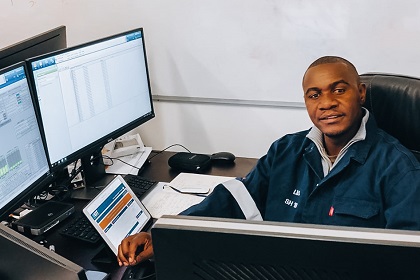
Completing High School in 2007 at the Academic Secondary School in Windhoek, Namibia, Lilongeni embarked on finding a profession that would give him real job satisfaction. He soon discovered he had an affinity for engineering, recognizing that good engineering projects could improve the lives of humans and the environments they live and work in.
By 2008, he had received a chance to fulfil an apprenticeship, which was sponsored by Namdeb Diamond Corporation. He commenced his Control and Instrumentation Apprenticeship at De Beers Lesedi Centre for Human Capital in Kimberley, South Africa.
After his apprenticeship ended in 2011, the following year saw him enrol, and work towards completing his 52727WA - Advanced Diploma in Electrical and Instrumentation (E&I) Engineering in Mining through the Engineering Institute of Technology. He initially was under the impression that he should abandon his plans to go straight into a working environment and opt to pursue academics first.
“Upon completion of the training program, I was employed as a Control & Instrumentation Mechanician at NAMDEB. 4 months into the role, I realized that I was punching below my weight. I approached my Chief Technical Officer about my wishes to leave work for further studies. After that discussion, he introduced me to EIT,” Geiseb recalled.
After completing his Advanced Diploma, and getting the qualification recognized through the necessary qualifications bodies in Namibia, he was promoted from C&I Mechanician to C&I Technician at work. Determined not to slow down in the development of his engineering career, Lilongeni registered for the 52708WA - Advanced Diploma in Industrial Automation in 2016.
Soon enough, he was promoted again to Senior C&I Technician, which saw him take on a host of responsibilities inside the company. He was supervising subordinates and doing complex technical oversight. He also had to take on leadership roles, leading a team of 3 technicians and 6 artisans. Together, they were all working on the various diamond-bearing ore processing plants and utilities in the Southern Coastal mines - the largest operation at Namdeb.
Organizational changes at Namdeb eventually saw Lilongeni switching roles, and providing new challenges for his set of skills. He was looking to still provide value in all the work that he did for them. However, he saw that some of the organizational challenges produced by the reorganization of the company required some proficiencies he still needed to refine. He thus enrolled for an Advanced Diploma in Management and Research Methodology. The electives in that course were: Financial Management, Public Sector Management and Human Resources Development.
In 2018, an opportunity arose for Lilongeni to work at Dundee Precious Metals in Tsumeb, Namibia. This is where he began working as a Process Automation and Instrumentation specialist. His work includes the optimisation of the plant operations relating to throughput, quality and reliability - whilst maintaining a safe environment. He tackles the technical workings of the Distributed Control Systems (DCS) and the Programmable Logic Controllers (PLC) at the plant as well. To master these systems, Lilongeni further added to his arsenal of skills.
“In January 2019, I enrolled for the BSc in Industrial Automation at the Engineering Institute of Technology. The course was directly in line with my career path. My aim in studying automation is to bring about change and exert influence in the world. To bring about change, one needs to be deemed competent. There isn’t a better competence than being a Registered Engineering Professional with Engineers Australia.”
The age of digitalisation has firmly been established, and is ongoing, Geiseb says. He says the most fascinating development in the industry is the arrival of artificial intelligence (AI). Thus, he is currently working through the Bachelor of Science (Industrial Automation) with EIT. Even though Lilongeni is still studying with EIT, he has seen the fruits of his labour after earning two qualifications prior.
“Life after EIT has been awesome, fulfilling and proving to be full of endless opportunities. As an individual, I have grown into a profession that values development. My quality of life has improved significantly due to the continuous growth and promotions,” he concluded.
Denis Tichagwa has gone from a young boy in 1980s Zimbabwe crafting wire toy cars, to working in a variety of roles ranging from mining to law enforcement. Equipped with a natural ability and fascination for STEM, Denis commenced his career in mining intending to progress to a career in engineering. However, an economic downturn forced him to transition to law enforcement. Despite setbacks, when the opportunity presented itself in 2018, Denis was determined to refocus his career in engineering and subsequently completed EIT’s Advanced Diploma of Civil and Structural Engineering online. Now working with Madison Square Holdings in South Africa, Denis has been able to pursue his passion for civil engineering and construction and is well on his way to achieving his lifelong professional goals through commencing EIT’s Bachelor of Science (Civil and Structural Engineering).
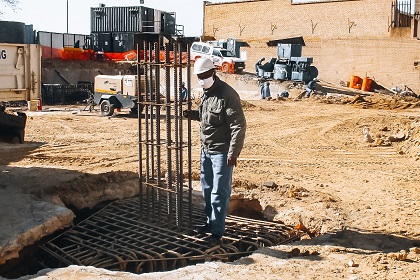
At Madison Square Holdings in South Africa, Denis’s daily responsibilities include administration, health and safety checks, maintaining a drawings repository, and checking that all works done by subcontractors are according to specifications. For Denis, civil and structural engineering is all about leaving a mark for all society to see, and improve quality of life.
“In engineering, I can gain respect, not only from the entities I work for but from civil society too. They are the people for whom we dedicate our ingenuity and we build our structures for. It is beneficial to them when we do our job, and it can change the landscape for generations to come,” Tichagwa said. But a role in construction is just one of the many roles Denis has had over the years.
Where it all started
Denis’ academic excellence was recognized in the seventh grade in the countryside in Zimbabwe. In a class of 400 students, he ranked second academically. Secondary schools, noting his achievements, offered him space in their schools. However, due to financial constraints, he settled for a state school.
“Determined to alter my situation, and that of my family, I studied very hard and earned respect from my educators. I was fascinated by maths, science and technical graphics,” Denis explained. “Each time we went to science lessons where we would perform practicals, we would watch our teacher doing very distinct tests which fascinated me. In the design class, we would grab our rather heavy drawing boards and get to work on our designs - much to the pleasure of our educator.”
Equipped with a passion for STEM, Denis emerged from high school and went straight into work. He worked at the local Vubachikwe Mine for four years, gaining crucial work experience. He learned first-hand how every facet of the mine operates and became accustomed to how all the processes worked in tandem.
Denis was expecting to continue his education in the mining industry, as the mining company had promised their workers that they would get subsidized education at the Zimbabwe School of Mines - a prestigious mining school widely celebrated in Africa. However, it was not to be. An economic crisis in the country in 2002 forced the mine to abandon the program and leave the students without a chance to study at the institution.
A new hope
“Undeterred I moved on and joined the police where I had a 5-year stint. There, I learned how the law operates. During these 5 years in the police, I enrolled with Harare Polytechnic College where my interest was to do with plumbing. Unfortunately, I did not finish, and I decided to move to South Africa,” Denis recalls.
Denis then, with a determined spirit to achieve, enrolled at the University of South Africa (UNISA) for a diploma in electrical engineering. After earning his diploma at UNISA, he continued looking for academic opportunities, even internationally, to augment the skills he developed working in engineering roles.
He subsequently came across the Engineering Institute of Technology. He learned that he could work towards getting an Australian qualification with global recognition that he could earn online whilst still working in South Africa. After weighing his options, on the many courses EIT provides, he chose the 52724WA - Advanced Diploma of Civil and Structural Engineering. He began charting a path toward an engineering career in a whole new direction.
A path toward engineering greatness
About his time at EIT, Dennis remarked: “Life at EIT was exceptional. I will forever be grateful to EIT for enlightening me in as far as engineering is concerned. My level of understanding in not only the construction field but the engineering domain in general has greatly improved. I am now rearing to go even further with my Bachelor of Science in Engineering with EIT and this time around, everything will be set.”
Denis now works for a construction company in Cape Town and has been doing so since 2012. He notes that the construction industry is rapidly evolving due to new technologies and the ‘latest developments in machines’ that are speeding up construction processes. Crews are now finishing projects faster than they ever were in the past.
After fulfilling many different roles in his employment history, and now looking forward to broadening his skill set with more qualifications, Denis says he would also love to run his own engineering company one day. At EIT, we encourage our students to be entrepreneurial and improve their society through engineering. We are thrilled to have Denis as an alumnus of our institute and we are confident that he will achieve whatever he sets his mind to.
Johnson Itumeleng is an industrial electrician from Botswana who recently graduated from the Engineering Institute of Technology with a 52726WA - Advanced Diploma of Electrical Engineering. He currently works for the Debswana Orapa Mine.
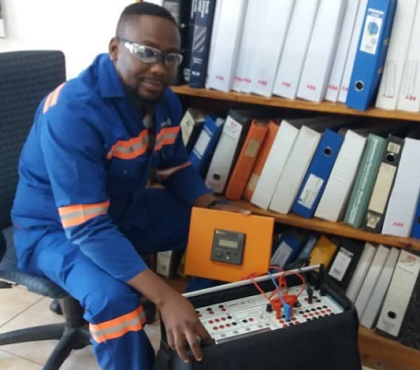 “I chose this course because I have always wanted to be an electrical engineer. My studying experience with EIT has been consistently good. EIT has a lot to offer and is very capable. I have learned a lot, and I am executing my daily work in a much more professional manner with what I have learned from EIT. I am recommending to my workmates to enroll in this course — one of my colleagues is actually already enrolled, in fact,” he said.
“I chose this course because I have always wanted to be an electrical engineer. My studying experience with EIT has been consistently good. EIT has a lot to offer and is very capable. I have learned a lot, and I am executing my daily work in a much more professional manner with what I have learned from EIT. I am recommending to my workmates to enroll in this course — one of my colleagues is actually already enrolled, in fact,” he said.
Johnson had immense respect for his grandmother as he grew up. He also had an affinity for engineering — specifically electrical engineering. With his grandmother encouraging him, and a dream to succeed in engineering, he was able to work hard and succeed at earning his advanced diploma with EIT.
“Kebatlhokile Dorothy Thatoyarona was a great inspiration and my motivator. She was my grandmother. She always believed in me and guided me throughout life until she passed in 2018. My love for engineering stemmed from my school years. I finished high school in 2003. I knew since I completed a school design project that I would like to do something with electricity,” he said.
Johnson has always been determined to figure out technological challenges. Ready and prepared to deal with technology through a more hands-on approach, Johnson started his career in engineering as an apprentice in Orapa Training Centre in 2007. The facility trains apprentices not only for Debswana mines but for other organizations across the country. Debswana is the world’s leading producer of gem diamonds.
The training facility provides their apprentices with significant on the job training in the mining sector. In 2012, after spending four years as an apprentice, he became employed by Debswana in the Power Distribution sector. He is responsible for supplying high voltage to the three mines and maintaining the HV equipment.
Acutely aware that he had to continue growing his theoretical knowledge and combine it with his ongoing practical experience, Johnson enrolled in the 52626WA - Advanced Diploma in Electrical Engineering with EIT.
Johnson says that he is gearing up to continue his academic and practical journey to becoming a fully qualified engineer. He has expressed interest in registering for the Bachelor of Science (Electrical Engineering) with EIT. By 2025, he aims to have earned that engineering title.
Aaron Giovenco is an electro-technical specialist who works in the maritime and offshore oil and gas industries. He says our 52708WA - Advanced Diploma of Industrial Automation developed both his theoretical and practical knowledge in the automation space, which will help him to further his career.
He began his career as an electrician after seeking employment opportunities in Perth, Western Australia, due to its mining boom. While studying his apprenticeship, he realized he was interested in engineering.
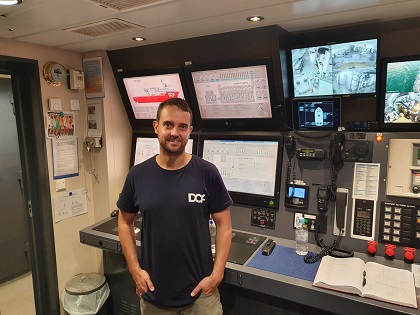
“Back in 2008, when pursuing my electrical apprenticeship, I found the theoretical side interesting and enjoyed learning it,” he said.
“This passion has continued to evolve over my career. I enjoy designing and coming up with solutions, which is why I’ve decided to pursue a career in the engineering industry, and automation and control engineering has great future job growth potential.”
Once he became qualified, Aaron spent a couple of years working in a myriad of different environments. One thing he says he noticed was how much technology had bled into the sector and fundamentally transformed it. After he took an opportunity to lead a team on a coal seam gas project in Queensland, he realized he wanted to pursue a career in the engineering industry.
He currently works as an electro-technical officer for a marine operations management company on Shell’s Prelude FLNG Project. The job sees him working with a team of people within the ship’s engineering department, and his responsibilities include carrying out electrical and electronic maintenance, repairs, diagnosis, installations, and testing.
“A key part of my role is maintaining high integrity and availability of key vessel systems such as power generation, VFDs with associated thrusters, and automation systems such as dynamic positioning. When breakdowns occur, I attempt to fault find and come up with a solution. However, sometimes this is not possible due to parts, which is why the redundant architecture is important to keep maintained.”
Throughout his career, Aaron has had to familiarize himself with automation technologies and complex instrumentation. He says that the trend of newly introduced automation technologies will likely continue exponentially into the future. Therefore, he decided to complete an advanced diploma through EIT that would encapsulate a broader scope of the industry in the one course.
“Studying the 52708WA - Advanced Diploma of Industrial Automation has enabled me to simultaneously strengthen theoretical knowledge within my present occupation, while also upskilling my qualifications for a future career. I chose Industrial Automation specifically because, in my opinion, it offered a broader range of subjects than a conventional electrical or instrumentation course and also because the qualification is formally recognized by Engineers Australia and internationally through the Dublin Accord.”
Aaron is planning to continue his academic and working journey with further studies.
“I will continue working for my current employer as the job suits me at this stage of my life. I’m also planning to study further - I recently enrolled for the Bachelor of Science (Industrial Automation) with EIT.”
Hamis Mahushi is a Tanzanian born instrumentation and control technician and alumnus of the Engineering Institute of Technology (EIT). Since graduating from our 52708WA - Advanced Diploma of Industrial Automation, he has furthered his career in the mining automation industry and taken on a leadership role. He currently works at North Mara Gold Mine, a few kilometers from the Serengeti National Park in Tanzania.
His engineering journey started in 2009 — which Hamis refers to as “the year of my life” — when he enroled in an Ordinary Diploma of Electrical Engineering. In 2012, he began working at North Mara Gold Mine, which was controlled by a company named African Barrick Gold at the time. In 2014, the company changed its name to Acacia Mining.
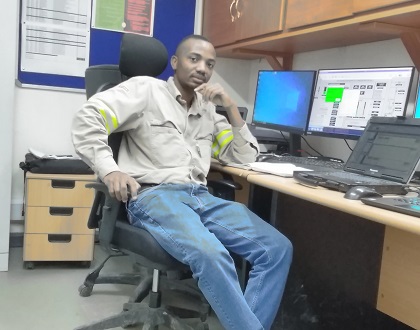
Under Acacia Mining, he got the opportunity to work as the Instrumentation Mechanician. A superintendent at the mine noticed Hamis’ thirst for knowledge and encouraged him to explore the automation side of the industry. Soon, Hamis was doing Programmable Logic Controller (PLC) training in South Africa. The bug had bitten, and Hamis wanted to know more.
He familiarized himself with the tools of the automation trade; Rockwell Automation products like the Rslogix 5000 and the FactoryTalk View ME and Panelview Plus. He was learning Rslogix function block programming and underwent training for SCADA on the software and hardware levels from Schneider Electric South Africa.
In 2015, he began an apprenticeship while working, and by 2016, he passed his instrument trade test. From that day forward, he could call himself a fully equipped artisan.
The passing of the trade test was wholly positive for Hamis. He was promoted to the role of Instrumentation and Control Technician. As he was settling into the job, he saw that it served him with a whole new set of complex challenges.
“I found out that I needed more knowledge that matched our new world of fast-growing technologies. I started looking for colleges on the internet, but I had a hard time believing I would find an online engineering course.”
In 2018, still on the search to expand his skills set, he stumbled upon EIT. He researched the options we had on offer, knowing he wanted to find one that would equip him for the future of the engineering industry. Finally, he found the one he was looking for: the 52708WA - Advanced Diploma of Industrial Automation.
“I had almost six years of experience in the mining industry — especially on the gold plant and water treatment plant — before I started studying with EIT. The Industrial Automation qualification covered everything within the plant — it just like special training for our plants. From instrumentation designs, electrical and mechanical problems, and industrial network and safety concerns”.
Hamis is one of the many examples of hardworking engineering professionals who are, as they continue to amass work experience, growing their skills with education and training.
Now, Hamis is the Acting Instrumentation and Control Supervisor at North Mara Gold Mine. He leads a team of four instrumentation technicians. His other daily responsibilities include the preparation of all instrumentation at the mine, supervising new instrumentation installations, and the ordering of new instruments. He masterfully troubleshoots PLC and SCADA systems and installs and troubleshoots VSD and high voltage instrumentation.
“I can see how happy my employers are when I am performing my tasks. This gives me a picture of my future, and my future will be great. My engineering career is expanding as I arm myself with more skills and knowledge.”
Hamis completed the course with EIT in December 2019 but does not want to slow down.
“I am still thirsty for knowledge. I wish one day to do a Bachelor of Science (Industrial Automation Engineering) with EIT. I encourage all people to open the EIT website and pursue their futures in engineering.”
Shepard Ngoni realized he needed to learn more about automation due to advances in technology that were affecting his workplace. After completing his 52708WA - Advanced Diploma of Industrial Automation, his newfound knowledge gave him the confidence to open his own automotive engineering workshop, plus a company that specializes in automation.
Since graduating from EIT two years, Zimbabwean born Shepard has been a member of our esteemed alumni community. However, his journey with engineering education, which started when he was in high school, is far from over.
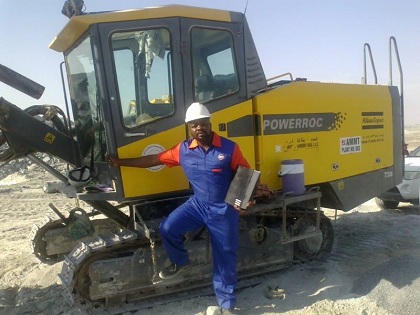
“As a high school student, I always admired the field of engineering as I was good in the fields of science subjects. From high school, I went straight into the field of automotive engineering as an apprentice with a national bus company, doing my theoretical studies with a polytechnic college in Harare.”
His automotive engineering studies took him four years to complete and included a lot of practical hands-on work, coupled with a theoretical research component. However, after completing his apprenticeship, he decided he wanted to continue learning. So, he enrolled in a diploma in motor vehicle technology.
At the same time, he worked as a diesel mechanic before deciding to move to South Africa from Zimbabwe. Once he arrived in South Africa, he worked in various companies, including Sandvik, Anglo American, and Lonmin Mines.
“I then decided to get out of Africa to seek greener pastures. That’s when I went to work in the United Arab Emirates. I worked as a drill rig technician for Sandvik, specializing in surface drill rigs made by Tamrock. During this time, I realized that the industry was swiftly shifting from being mechanical to being a more automated kind of industry. I felt I needed to bridge that gap as soon as possible.”
He subsequently enrolled for the 52708WA - Advanced Diploma of Industrial Automation with the Engineering Institute of Technology (EIT). He believed that the modules EIT offered him were in-line with what he thought he lacked in his career. During this time, he made his way back to South Africa, working as a maintenance engineer with a transformer manufacturing company.
“The studies made my work much easier and helped me to understand the design and architecture of all kinds of machines, including motor vehicle process and system design. The qualification I got from EIT enables me to be registered as an engineer with the Engineering Council of South Africa.”
Shepard says that the impact his advanced diploma has made on his career is huge, having given him the confidence to open an automotive engineering workshop that specializes in German-engineered vehicles. On top of that, he has also started a company that specializes in automation. His daily responsibilities include process analysis, troubleshooting, job allocations, and supervision.
He is looking forward to passing the baton to the next generation and training them up so they can also be ready for the kinds of engineering work of the future.
However, Shepard is still broadening his skills and knowledge — he is currently studying for a Bachelor of Science (Industrial Automation Engineering) with EIT. He plans to continue studying until he has achieved his Ph.D. By then, he believes he would have mastered this new world of automation in the engineering industry. We are proud to have him on our alumni list and wish him well for his future endeavors.
Wilbard Mwetulundila is a marine electrician working on a mining vessel for diamond mining company Debmarine. He is an Engineering Institute of Technology graduate and esteemed alumni. He has an unwavering love for engineering, and despite the challenges he has had to overcome, he is developing into a skilled engineer.
It all started with the boyhood curiosity that grips so many: a fascination with technology.
“I was raised in a small village in the northern part of Namibia,” he said.
“When I was a toddler, I used to be very fascinated with battery-operated toys and how they operate. Since then, I have had persistent curiosity — I always had a picture of myself working in an engineering space. Given that burning passion, it was just a matter of putting in the effort to fulfill my dream”.
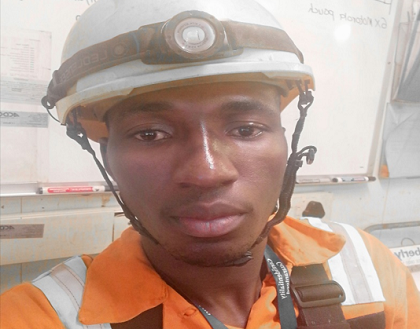
Upon completion of high school in 2008, Wilbard applied to study electrical engineering at one of the local universities in Namibia. He, unfortunately, did not get admitted on to the course he wanted to complete. It was a sudden turn of events for him which culminated in him having to enroll for another option.
However, he vowed that he would pursue a career in engineering by all means necessary. He dropped out of the course and took up a general electrical course at the local vocational institute.
Graduating in 2012, Wilbard went straight into employment. He began work for Namibia’s Elgin Brown & Hammer as a marine electrician. After gaining experience there for two years, he moved on to work for SABMiller Namibia, a multinational brewing and beverage company.
At SABMiller, he completed a course on SANS 10142 installation rules, which was a prerequisite to obtaining a wireman’s license so that he could formally become a professional certified electrician. At SABMiller, Wilbard saw that automation was taking over the electrical engineering field.
“I realized that it is imperative anyone in this field needs to cultivate a good understanding of automation in order to remain relevant. It is also necessary that one masters the basics of electrical engineering before tackling the automation part.”
Wilbard wanted to keep expanding his career and find new and exciting challenges. He wanted to go back into the marine industry while trying to find an institution that could further help him learn about the electrical engineering industry and the automation world. He went to work for Debmarine in Namibia in 2016. Debmarine is Namibia’s leading marine diamond mining company.
To further augment his skills and keep growing in his career, Wilbard decided in July 2018 to enroll for the 52726WA - Advanced Diploma in Applied Electrical Engineering (Electrical Systems). He doubled the course up with a national diploma in electrical engineering from a college in South Africa.
“I had been working for close to 7 years in the electrical industry before enrolling with EIT. Given the years of experience, I was under the impression that I knew it all, but one module into the course, I realized that my knowledge was only limited to the environment I was working in. Since then, I started seeing technical aspects from new perspectives.”
Wilbard says that his employer has been amazed by his improved workmanship and consistent compliance with engineering ethics - which he all chalks up to EIT’s training. He says he has become more productive and developed critical thinking skills.
The world is Wilbard’s oyster, as he decides what his next chapter is going to be. He says he is closer to achieving his career goals than ever before. For now, he is applying everything that he learned in his advanced diploma course:
“Life has been amazing ever since I left EIT. At this stage, I am still figuring out what I am going to do next, but I am thankful that EIT offers support to students even after graduating, and hence I still keep in touch with lecturers.”
Wilbard has floated the idea of doing a Bachelor of Science (Electrical Engineering) with EIT in 2021. In the meantime, he is enjoying his fulfilling job, where his daily challenges include maintaining, repairing, supervising, analyzing, and enhancing the electrical systems on-board the marine vessel. We wish him well in his future adventures.
Mikkaela Hughes is an Engineering Institute of Technology graduate who recently earned her 52810WA – Advanced Diploma of Mechanical Engineering Technology. Mikkaela rose above adversity to pursue her career in engineering, and her story proves there is not just one pathway to take you from studying to the workplace, but that there are many approaches that can lead to success.
Mikkaela currently works in the tank manufacturing and refurbishment industry in South Africa. She is responsible for ensuring that her company provides products that comply with the design requirements set by clients. Mikkaela is fascinated with engineering because of the problems it presents.
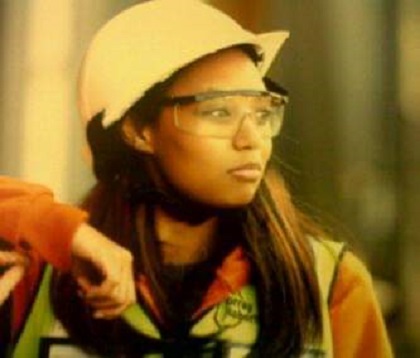 “I am a very open-minded, creative, and passionate individual who thrives on challenges and complexity. I feel that the field of engineering stimulates me and challenges me daily as I get to encounter many challenges on a daily basis, and hence grow from them,” she said.
“I am a very open-minded, creative, and passionate individual who thrives on challenges and complexity. I feel that the field of engineering stimulates me and challenges me daily as I get to encounter many challenges on a daily basis, and hence grow from them,” she said.
Mikkaela began studying mechanical engineering on a full-time basis in 2010, but due to financial restraints and life getting in the way, she was not able to continue her studies. As a result, she determined that she needed to start working.
“I started working in the engineering/construction management field in 2012, at the tender age of 20, and have been in this industry for about seven years now. During this time, I have been fortunate enough to be exposed to various aspects of the engineering field.”
While she hit the ground running with work, she began new academic endeavors as well. She completed her Basic, Intermediate, and Advanced Project Management Certificate during this time, as well as a Welding Inspection Diploma. At work, she gained exposure to pressure vessels, piping, structural steelworks, civil works, painting inspection, boilers, tankage fabrication, and maintenance as well as progressive tracking and resource allocation and planning.
Mikkaela managed to bring herself out of a difficult situation, equip herself with necessary skills and practical knowledge, and become a better practitioner in the engineering industry. With her previous industry experience, she began studying her 52810WA – Advanced Diploma of Mechanical Engineering Technology with EIT.
“I was highly impressed by the course content, which was so diverse and touched on many engineering aspects. This course covered content that I have not seen at other institutions. I was also impressed by previous students’ testimonies.”
Mikkaela says that her employers have been positive about her EIT qualification, and she is now determined to continue her academic journey and further enhance her career.
“Life after EIT has been blessed! I feel more confident in my working environment and more knowledgeable. Due to the completion of this qualification, and many more to come, I definitely see many doors being opened. I see myself maturing in this field and every aspect of engineering.”
She says that there is always a challenge to endure and solve in engineering - she maintains that it builds character and motivates her to keep going because she won’t rest until problems have been resolved. So far, her journey in engineering might have been different, but she has been able to gain momentum in her career.
“There were many challenges that stood in my way to complete my qualification. These included working 12-hour shifts seven days a week, financial setbacks of which I was not working for six months in 2018, having to relocate three times for work purposes, as well as the pressures and challenges and setbacks of life in general. But, my main goal was to persevere and complete my qualification and become the best engineer to pave the way for future engineers, particularly women in engineering.”
Determined to succeed, Mikkaela has done everything in her power to exact her own unique career progression. Her determination has been nothing short of impressive - but the journey isn’t over yet. She is considering several options that EIT presents in terms of degrees and certificates, so she can continue to build on her already substantive skill set.
“I would definitely encourage young people to pursue a career in the field of science, technology, mathematics, and engineering if they have an aptitude and passion for this field.”
Manga Olivier is a Chadanian engineer who completed his Master of Engineering (Industrial Automation) through the Engineering Institute of Technology. He currently works for ExxonMobil in Chad as an Instrument and Controls Engineer. His career has grown in leaps and bounds over the years, but his fascination with engineering began when he was younger.
“I was interested in engineering at a very early age. I like challenging situations in the realm of troubleshooting faulty devices, appliances, and equipment. I liked discovering new technologies from a young age too. All this led me to technical schools at college level.”
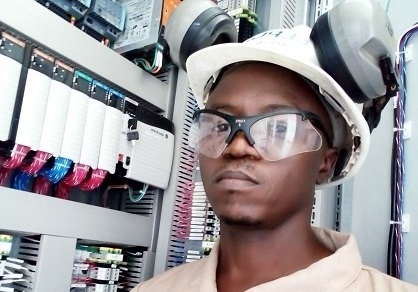
Manga started his engineering journey in school, and in 2002, he pursued a Bachelor’s Degree in Electro mechanical and Industrial Computing, which he finished in 2005. In 2007, he found employment at the Chad Brewery Company, where he worked from July to September.
In September of that year, he switched companies and began to work for Esso Exploration and Production Chad Inc. as an Instrumentation Technician. It would turn into an eight-year stint that would see him working indirectly for ExxonMobil. In those eight years, he would fulfill roles as an Instrumentation Technician, a Measurement Technician, a PLC Technician, and then his final role, which he is in today.
However, it was in mid-2015, Manga decided to broaden his knowledge in the engineering world once more. He began studying his master’s degree with EIT in July 2015 and graduated in October 2018. At the time of enrolling for the course, he was an Instrument Technician but knew he wanted to learn more so that he could progress his career in automation.
“When I started the course, I was working as an Instrument Technician, and when troubleshooting tricky issues related to PLC, I just got stuck and asked for help from a PLC Technician. As I progressed with the course, my troubleshooting skills were getting better and better, and finally, I was appointed as a PLC Technician.”
Right after he graduated, ExxonMobil promoted him to the role he is in today; Instrument and Controls Engineer. The daily responsibilities at his job include:
- Process engineering surveillance
- Place orders for instrument and control spare parts
- Initiate MOC for equipment when needed
- Make changes to PLC or DCS logics when required
- Tune process loops when the process variable (PV) is not following the setpoint (SP)
- Root cause analysis for equipment failures
- Manage small projects
- Edit or make changes to P&IDs
- Assessor and procedure editor
Manga is an excellent example of a dedicated worker with a hunger for knowledge. As a result, he has been internally promoted within ExxonMobil. Now, he is encouraging others to follow in his footsteps.
“I would encourage young people to pursue a job in whatever field they would feel at ease and have a good career plan because a job is one’s life. A good book to read to get started on automation is ‘Safety Instrumented Systems: Design, Analysis, and Justification’ by Paul Gruhn and Harry L. Chedie.”
He thinks that employers are already accepting the high-quality online qualifications EIT is offering. He is also highlighting the fact that the world of engineering has changed, which requires a broadened knowledge of all engineering disciplines - which traditional universities are unable to cater for.
“I cannot thank EIT enough for what lecturers gave me as knowledge during that training - I now have knowledge in almost all engineering fields. I feel like having boots on the ground when discussing engineering topics thanks to EIT.”
Armando D. Ngojo is an Engineering Institute of Technology graduate who recently completed our 52705WA - Advanced Diploma of Biomedical Engineering.
Currently working in the healthcare engineering industry for a company that maintains and manages medical equipment, Armando has spent fifteen years in the technological side of the medical industry. However, Armando’s interest in engineering began at a young age.
“When I was younger, I was very fascinated with the functionality of the transistor radio. I opened it up and saw a lot of small things and components which fired up my curiosity. I was amazed at how a television worked. How a refrigerator cooled the items inside of it intrigued me.”
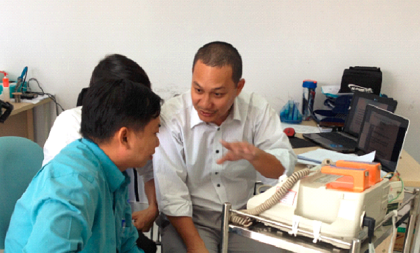
In his secondary school years, he pursued his love for technology further by enrolling in an elective that covered electricity & electronics. After high school, he began to pursue a career in Electronics Engineering. However, Armando’s road to an engineering career was not an easy one.
“When I was in college, I went through a lot of ups and downs. Initially, in 1996, I was a freshman scholar with tuition discounts but it was abruptly terminated after the first semester only. I failed the cut-off grades to maintain the discounted fees,” explained Armando.
“I was also out of university the following year due to financial issues. In order for me to continue my studies in the year after my hiatus, I became a working student and helped my family survive while pursuing my degree.”
In college, Armando had the opportunity to work with simple medical equipment like suction machines and OT lights in conjunction with his studies at college. It was in that role where his interest in the healthcare engineering industry was sparked.
After graduating from college, Armando got a job at a local medical sales and service company in the Philippines as a Biomedical Service Engineer. This role unlocked a world of opportunities, which resulted in Armando working full-time in Malaysia for seven years, Vietnam for one year, and Abu Dhabi and Dubai for more than five years.
After many years of working in the industry, Armando felt that he wanted to take the next step in advancing his career. He went on a search for a biomedical engineering course that would allow him to upskill even further, and that is when he discovered EIT. He noticed our Advanced Diploma in Biomedical Engineering was exactly what he needed.
“I took the course because although I was already working in the healthcare industry for the last 15 years, I lacked a proper school qualification. This is due to my home country; in the Philippines, no university was hosting a real course in Biomedical Engineering in my time.”
Since he has graduated, Armando has found that his daily responsibilities at work have become easier to manage.
“Professionally, I got a promotion within my company and was given more responsibilities, and of course, better remuneration. My newly acquired qualification also opened up a lot of opportunities for me. Being an EIT graduate was a power credential in my portfolio.”
He is now waiting for EIT to begin hosting a Master’s Degree in Biomedical Engineering so that he can continue building on his knowledge base in the technological realm of the healthcare industry. He concluded:
“I am very interested in pursuing further studies in this field due to the fact that with my current job requirements, the face to face interaction with medical officers like nurses, lab technicians, radiographers, and doctors are always imminent. I need to learn how to converse with them using medical terminologies they understand. I am talking to them with more self-assurance after graduating with EIT.”
Armando is fascinated by the developments occurring in the biomedical engineering industry. He says that the emergence of AI and 3D printing of organs has been particularly interesting to watch. He says the course through EIT delved into some of those topics and opened his eyes to the development occurring in the space. As the industry continues to grow, he sees his career growing.
“My career maturing in the upcoming years is a definite! I know that the industry that I am currently in will become very competitive in the coming years, but I am very confident that I will survive because my years of extensive experience in the industry are already backed up by my proper and formal school qualification achieved through one of the best technical schools in Australia: EIT.”
Islam Sarwat graduated from EIT in 2015 with a 52742WA - Advanced Diploma of Plant Engineering. Before completing the program, he was an in-training operation and mechanical engineer. He noticed that he had some spare time on his hands and a dream to attain a senior engineering job in the future.
Islam chose this particular program because, he says, it was comprehensive and covered a lot of material that would improve his knowledge and enhance his skills. He also knew it would help him find direction in his career.

“My studies helped orient me in choosing which engineering industry to go into. The engineering industry has a lot of different varieties and disciplines. Instead of one particular field, it includes many different fields.”
Islam found that the pathways to being hired in a high-level job became more likely after completing the plant engineering program.
“Life was better. I felt that I did what should be done to enhance my skills. I extracted immense value from my studying with EIT. The course definitely added to my skill set in my work environment.”
After three years of studying, he got what he was hoping for: Islam was appointed as a project lead in the new extension of the plant for the company he was working for in the Industrial Gases industry. His daily responsibilities include:
- Process optimization
- Efficiency enhancement
- Preparing reports regarding plant performance
- Preparing maintenance and operation budget
- Carrying out preventive and corrective maintenance
- Implementing production plans
Islam is looking forward to the future challenges his career in engineering may throw at him. And now, he is looking to the next career challenge of leveling up to more senior (and managerial) positions.
“I have met the challenges that have come as my career has matured. I overcame these challenges, developed my skills, and improved myself by studying and training in my field. I for sure, have a better future. I plan to improve my managerial skills to shift from the technical world to managerial positions.”
Sefiwa Monyamane is an engineering professional and Engineering Institute of Technology graduate from Botswana. Currently working at a state-run electricity utility company, Botswana Power Corporation, Sefiwa is a scholar of the world of electrical engineering. But why did he choose the world of electrical engineering and more specifically, EIT?
“New inventions are ever-changing in complexity, especially in power utilities. As an innovative individual, I thought this was the right course and the right field to express my interest in the technologies of the industry.”

Sefiwa first began to pursue a career in electrical engineering many years ago. He attended Shashe River School between 1999 and 2000. There he received his Botswana General Certificate of Secondary Education (BGCSE) in Physical Sciences. Soon after, he enrolled for a Diploma in Electronics and Electrical Engineering at the University of Botswana, receiving his diploma in 2003.
In 2005, he went on to work in Broadcasting Services as a Transmission Technician. Three years later, he would join the Botswana Power Corporation as a Commercial Technician, working there from 2008 to 2016. It was during this time that Sefiwa enrolled for EIT’s 52727WA - Advanced Diploma of Electrical and Instrumentation (E&I) Engineering in Mining.
Sefiwa enrolled in the program after the profession he was pursuing began demanding that he continue to develop his skills in the industry.
“I have come to understand the entire scope of work across the power industry in the particular sector I am in. It was covered by the modules in EIT’s course. The course captured every aspect of power from generation to distribution, which was useful because now I utilize the knowledge in my daily work.”
In 2016, he found himself fulfilling a role as an Operations and Instrumentation Coordinator at Serviceline Engineering. He remained in that role until rejoining Botswana Power Corporation in 2019, this time, and he worked as Planning Technician for the state utility. His day to day responsibilities include load forecasting and network extensions to cater for future scenarios at the utility.
Sefiwa is looking forward to the remainder of his ever-expanding career and is currently considering enrolling for the Bachelor of Science (Electrical Engineering) with EIT. He is also keen on learning more about renewable energy technologies as he notices the power generation industry moving away from coal-based generation to solar energy. EIT caters to that too — students can seek out the 52764WA - Graduate Certificate in Renewable Energy Technologies.
Sefiwa’s career progression and academic journey is proof that he is an individual dedicated to serving his community, improving lives, and working towards a better future.
“With the dream of obtaining my bachelor's degree, I foresee a change in the way our utility generates its power - especially because the world is embarking on utilizing green technologies. And I want to be ahead of the learning curve when it comes.”
Ijaz Ali is a graduate of the Engineering Institute of Technology based in the United Arab Emirates. He completed his 52724WA - Advanced Diploma of Civil and Structural Engineering in March 2019. He has recently embarked on his journey of acquiring a Bachelor of Science (Civil and Structural Engineering) with EIT.
He chose to study these qualifications because of the industry he works in; he works in the field of Transportation Engineering, which is a subcategory of Civil Engineering.
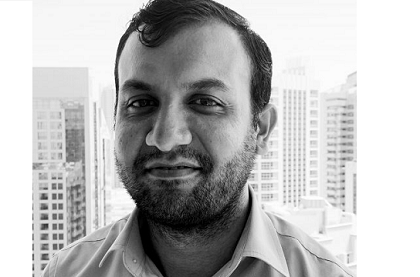
To get to where he is today, he started his journey in 2007 when he did a CAD certificate and worked with an Engineering Consulting office. His affinity for engineering in his day to day work is apparent.
“I chose this field as I was fascinated by how easily and systematically one can solve complex issues through engineering. It is a very well-structured field with proper procedures and standards that govern it, and this is the main reason why I like it.”
Ijaz already had close to eight years of experience in the Transportation Engineering industry before he began building on his skills with EIT.
In those eight years, Ijaz has seen immense development creep into the industry. He has seen mobility as a service, like Uber, become a societal norm. He has seen engineers hypothesize multi-national road traffic safety projects to eliminate all fatalities and serious injuries on roads, otherwise known as Vision Zero. And he has seen the incredible development in the autonomous driving industry. At his current job, he forms part of the ITS & Transportation Team.
“I am involved in the design and studies for different ITS strategies such as the Traffic Control System, Road Weather Information System, FOC Network and CCTV Connectivity. I support the team in preparing drawings, feasibility reports, and traffic studies. Previously I was also involved in the design and studies for Internal Roads, Highways, and Parking areas. I was also involved in obtaining their approvals from the local authorities. I also prepared longitudinal and ROW sections for the same along with the Stormwater, Sewerage & Streetlight design. I also proposed utility corridor designs for it. In addition to that, I have worked with the QS and Project Management team for cost and schedule estimation, for forecasting UpToDate.”
Ijaz now works at the Surface Mobility Consultants head office in TECOM Dubai, where he mostly works on projects with Integrated Transportation Center (ITC – DOT) for the implementation of Plan 2030. He has equipped himself further with Transport Engineering and Project Management short courses to ensure that he remains as proficient in his trade as possible, and gaining domain expertise as he goes along.
“I am still part of EIT as I have continued my studies through the bachelor's program, but I can say that after obtaining my Advanced Diploma, I am now officially recognized as an industry professional and I am also in the process of being recognized by Engineers Australia at the Engineering Associate Level.”
Ijaz has gotten this far in the industry and intends to go even further. He says that the elephant in the room nobody wants to discuss in the industry is the effect of the massive carbon footprint that the transportation industry creates - something he wants to contribute towards fixing.
Sometimes Ijaz tries to fit in some reading into his busy schedule. He encourages people to pick up a copy of ‘Seven Habits of Highly Effective People’ by Stephen Covey. He also encourages young people to pursue a career in engineering as it is ultimately a rewarding career path. He concluded:
“Engineering is an ever-evolving discipline that affects our day to day activities and sustains the system we are currently living in. This is why I would highly encourage young people to consider pursuing a career in this field.”
Ryan Smith is an Engineering Institute of Technology graduate who earned his 52705WA - Advanced Diploma of Biomedical Engineering in 2018. First working in the audio engineering industry, Ryan now works for an American multinational conglomerate in the healthcare industry. His engineering journey proves that, regardless of the discipline, you can go cross-disciplinary based on your passion for technology alone.
After completing a Diploma in Audio Engineering in 2011, Ryan spent six years in the professional audio industry. However, Ryan always had a predisposition to technology, and this keen interest led him to apply for an apprenticeship in electronics.
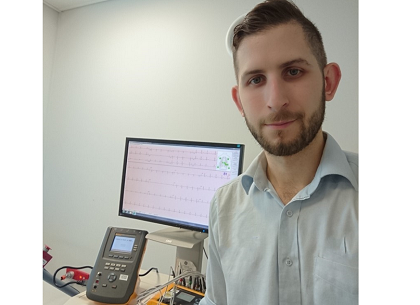
From that apprenticeship, Ryan was granted a trade qualification in Electronics and Communications. Now equipped with expanded electronic knowledge, he found employment within the biomedical industry. His work now saw him repairing, maintaining, and installing medical equipment.
Answering why he chose the engineering industry, Ryan said, “I pursued a career in the engineering industry to satisfy my curiosity for technology and problem solving. It’s incredibly fullfilling to be a part of something that benefits the wider community, and I love seeing a challening project come to successful fruition.”
Working in the biomedical field sparked Ryan’s curiosity even further, soon enrolling for the 52705WA - Advanced Diploma of Biomedical Engineering through EIT.
“I chose biomedical engineering to compliment my background in electronics and further understand how technology interplays with anatomy and physiology. The course impacted the way I interact with clinical stuff, empowering me to confidently understand the medical lexicon. I gained a higher appreciation for the devices I work with and their impact on people’s lives.”
His daily responsibilities include installation, repair, and servicing of medical devices in the fields of invasive and diagnostic cardiology, anesthesia, ultrasound, patient monitoring, and maternal-infant care. He is responsible for ensuring new systems are installed to Australian and global standards before clinical use. After installations have been done, he has to ensure those machines keep on functioning — which includes preventative maintenance and corrective repairs.
Life after EIT
Ryan is now actively building on his skills set within the biomedical sector. He has started an Associate Degree in Science, focusing on biological and information technology.
“I have an elevated level of confidence in my day-to-day work life, thanks to my qualifications. It’s opened up various avenues for my career and inspired me to continue studying in the biomedical sciences field.”
Ryan says that employers have reacted positively to his qualification from EIT. He says it has increased his visibility in the biomedical field and has opened various avenues for his career progression. EIT’s novel online training methodology allows students to progress in their careers while also gaining their qualifications.
When he is not busy at work in his engineering role, he fills his spare time with being an engineering hobbyist, keeping fit and reading. He says he enjoys designing PCBs for audio devices, long distance running and his favorite author is Dostoevsky.
When asked if he would recommend a career in science, technology, engineering, or mathematics to young people, Ryan said, “Absolutely! Technology is constantly changing. A career in these fields keeps your mind constantly engaged and developing new skills and knowledge.”
Thanks to the qualification from EIT, and his appetite for continued studying, Ryan’s career prospects are looking brighter and brighter. It seems that the biomedical industry has inspired him to continue trying to utilize technology to make people’s lives better. When asked about how he sees his career maturing in the upcoming years, he said:
“In the upcoming years, I see myself involved in training and development in the biomedical field. One thing I love about learning things is being able to pass that knowledge on. Teaching and development is a strong way to reinforce your own learning and constantly keep yourself in check.”
Jules Bekoka Botomba’s story is an inspiring one. He is an Engineering Institute of Technology graduate who, despite the odds, managed to bring himself out of a difficult situation and turn it into success in the automation world.
He has obtained two qualifications with EIT.
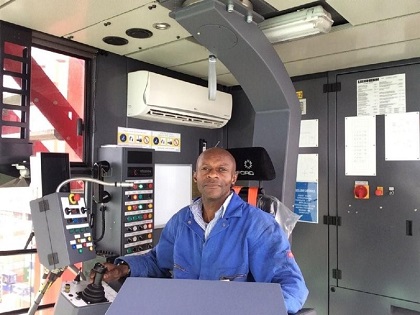
During the Second Congo War in 2001, Jules and his family had to escape the country, effectively becoming refugees. Jules fled, looking for asylum in Johannesburg, the largest city in South Africa. Coming from the DRC, Jules was predominantly French-speaking. He soon found he would have to learn English to communicate with the South Africans.
Jules realized it was going to be tougher to assimilate to South African customs than he initially thought. Asylum seekers who were waiting to be recognized as refugees were not permitted to study or work in the country.
This set Jules — a man who fantasized about having a career in engineering since he was a young boy — considerably back. The prohibitive legislation was only repealed in 2003, but, finally he could get a job. Equipped with only a matric certificate from the DRC, he went to Cape Town to try and find a job. So began his journey to develop his skills so that one day, he could be recognized as an engineer.
Jules bought a newspaper and checked the classifieds, eventually finding an ‘electrician wanted’ position. Without even knowing how to pronounce the English words in the electrical industry, Jules went to the interview for the job. He soon found out that he was to be challenged. The interview for the job consisted of having to fix 100 broken fluorescent light fittings — of which he managed to fix 60.
The employers were impressed, and he got the job with MetroRail Limited, where he worked from 2004 to 2006. In this time, he did an associate’s degree in electrical, electronic, and communications engineering technology through Intec College in South Africa.
Moving from Cape Town to KwaZulu-Natal saw Jules working for Bidvest Logistics as a Technician working from 2006 to 2007.
This is where he came into contact with programmable logic controllers, human-machine interfaces, and general automation technologies. When he began working on these technologies, he knew that in the future, everything would become automated, and if he did not focus on improving his technical know-how in automation, he would be left behind.
Jules then secured his dream job, working as a Port Automation and Control System Engineer with the Liebherr Group. They were working with the KwaZulu-Natal government to expand the piers at the port of Durban. On this job, he met a handful of engineers that reinforced the idea in Jules’ head that automation was taking over the industry. The project that the Liebherr Group did for the government of KwaZulu-Natal helped grow the economy of the region in the seven years they worked on the project.
To further build on his knowledge in automation, Jules enrolled for the 52677WA - Advanced Diploma of Remote Engineering, Mechatronics and Robotics with the Engineering Institute of Technology.
In 2015, Jules decided to look for employment outside of South Africa. This saw Jules working on ports up the coast of West Africa, namely in Nigeria and Togo.
However, he had a feeling that his true engineering potential could be realized in the United States. He began working for Interplex Automation, ArcelorMittal, and finally ended up in his current role.
Jules now works as a Lead Software Design Engineer in PACCAR — a leading truck manufacturing company in Texas. The company produces 190 trucks every 8 hours, and Jules is in charge of making the manufacturing process as efficient as possible.
Jules Bekoka Batomba is a shining example of how to overcome obstacles to get to where you need to be. Arriving in South Africa with nothing to his name but a matriculation certificate, Jules managed to elevate himself thanks to a brilliant work ethic and a hunger for knowledge — specifically in the automation world. The result is a worker who will continue to thrive in the fourth industrial revolution as the world continues to automate and transform the job markets.
Jules has recently graduated again with his Master of Engineering (Industrial Automation) from the Engineering Institute of Technology. He is now pursuing a master’s degree in robotics through the Ancestor Polytechnic Institute. There is no stopping Jules now — he has become what he always dreamed of as a young boy: a fully qualified engineer.
Gerrit Botha is an engineering professional currently working in the automotive, brewing, and mass manufacturing industries. He is also an Engineering Institute of Technology graduate. Once he completes his current studies, he would have undertaken four courses with EIT.
He obtained his Professional Certificate of Competency in Allen Bradley Controllogix/Logix5000 PLC Platforms in May 2016. He followed that up with a Professional Certificate of Competency in Instrumentation, Automation and Process Control, in 2017. After that, he earned his 52677WA - Advanced Diploma in Remote Engineering, Mechatronics and Robotics in July 2017. He is now working through the 52708WA - Advanced Diploma in Industrial Automation.
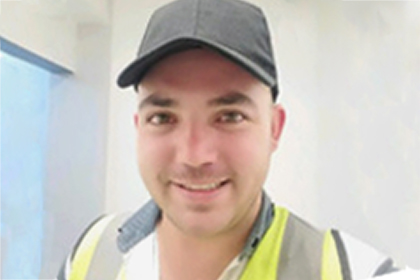
Gerrit’s engineering career, while impressive looking — based on how many qualifications he has amassed — has been filled with ups and downs. His journey reveals how one can both be a student of engineering and life. His love for engineering stems from his childhood days.
“I have always been fascinated by how things work,” he said.
“Even when I was young, I was more intrigued by taking apart and investigating my radio controlled car than I was with actually playing with it. This curiosity just never left me and that’s why engineering was a natural choice.”
Further enhancing his love for engineering was spending time in his father’s engineering workshop. His father serviced the structural steel and earthmoving machinery market. One of the first artisanal skills Gerrit learned was the operating of milling machines and lathes. On weekends, he had a part-time job rewiring trucks and earthmoving machinery.
As a hobby, Gerrit busied himself with learning programming. He also had a knack for mechanical and electrical machine setups. He was a proverbial kid in a candy store when it came to exploring technologies. When the time came for him to decide what he was going to do in terms of tertiary studies, he chose mechatronics. However, his life then changed significantly.
“Unfortunately, at the beginning of my final year of school in 2012, my father passed away unexpectedly. This put heavy financial strains on our family as my father was the main provider. So, I decided to put the studies on hold in pursuit of employment to support my mother and our family financially”.
Employed... but ready for more
Gerrit managed to secure a job in construction engineering management in the petrochemical industry. There, he learned how to refurbish hazardous chemical vessels. He specifically became familiar with the Safety, Health, Environment, and Quality (SHEQ) engineering ideologies. During his time in that role, he formed part of 4 vessel projects and acquired numerous health and safety qualifications.
This allowed him to take care of himself and his family financially. He concluded that he should finally get back to his studies.
“Unfortunately, in this ever-innovating and expanding engineering discipline that is mechatronics, I could not go back to my old varsity as the curriculum had a substantial facelift. Nonetheless, with my busy lifestyle, I knew I needed to find a varsity that could offer me a program that is flexible and via correspondence. Finally, I came across EIT.”
To familiarize himself with the online method of study EIT presented him, he decided to do two short professional development courses. Soon he knew he wanted to continue. He was ready to pick up his mechatronics once more, and that’s when he enrolled in the Advanced Diploma in Remote Engineering, Mechatronics and Robotics.
Career change
Gerrit changed careers during his studies with EIT. He went to go and work in an environment where he could learn more about the world of PLC programming by fulfilling a role in the beverage brewing industry. He was soon promoted to a project engineer after only two months at the company — all thanks to his project management and leadership skills.
Twelve months later, he was the engineering manager of the company. He introduced some cost-saving initiatives within the company at the manufacturing level. He has since started the Advanced Diploma in Industrial Automation with EIT and is aiming to complete a Master of Business Administration when he completes the program.
EIT proved to be the best fit for Gerrit. Life threw its fair share of curveballs his way, but he emerged victorious. He managed to equip himself with both theoretical and practical knowledge and become a fully-fledged engineering professional.
But, Gerrit has learned that the education of life and engineering seldom ever end.
“The more I study, the more I find out how little I actually know. It’s exciting to be part of this growing organism called engineering - and I continue studying so that I am on the top of my game,” he said.
“I love engineering and the ever-expanding organism it represents. My short career has been filled with more challenges than the norm, but it has taught me that there is always a way to change your situation. You just have to be willing to take the first step and, of course, have patience. As the famous saying goes: ‘Rome was not built in a day.’”
“I would like to use my experience as an inspiration for current students as well as those contemplating enrolling for online classes. Studying while working is no easy task, but with the right counsel and advice from someone who has gone through the process, it can be a big drive for those experiencing the same.”
Mildred Nanono completed her Master of Engineering (Industrial Automation) through EIT, and we are proud to announce she is our Student Ambassador for 2020.
Studying online from Uganda while working full-time as an electrical engineer presented some challenges; however, Mildred says that EIT’s unique delivery model made it achievable even on her busiest days.
“The online studying experience was remarkable for very busy employees like myself. At the time of studying, I was engaged in big projects back home. The online classes allowed me to carry my class everywhere I went, even on days away from home, during factory acceptance tests in other countries.

“During my time, there were two study sessions for each lecture — this created flexibility for my busy schedule. Additionally, during the busiest of days, it allowed for submission of a summary report in the event I missed both sessions, making attendance score achievable in a busy world.”
In addition to the flexible study options, Mildred also commented on the support she received throughout the program, from the application process through to submitting her thesis.
“Applying for my course was very smooth. The learning support officers were readily available for support. Communication was timely and on point.
“My supervisor for the thesis was very constructive and instrumental during the entire process of my thesis development and completion.”
EIT is one of the only institutes in the world specializing in engineering. As a result, our lecturers have applied knowledge, which they impart to ensure our students graduate job-ready. Given the majority of our students are already employed in the engineering industry, our classes allow you to form global contacts and learn from each other.
“My class had experienced students who had worked with distributed control systems. Likewise, the lecturers not only had the theory but also loads of practical experience.
“Particularly, during my last year of study, I was reviewing the designs for the upgrade of our distributed control system, and my lecturers helped to come up with the best solution. Coincidentally, the modules I covered that semester related closely with my work. The online laboratories were exceptional. I never felt the need to travel to Australia.”
While Mildred tells us she did become somewhat scarce during her studies as her focus was on work, attending classes, completing coursework, and preparing for exams, she says the knowledge and skills she gained from the degree made it all worthwhile in the end. Since completing her degree, she has taken a job as a control and instrumentation engineer.
“My employer appreciated the study model, as I was never absent from duty, and I have grown tremendously in my career as the current control and instrumentation engineer. As such, my employer has agreed to sponsor my colleague for the same course.”
She tells us that the next career objective she hopes to achieve is a management role, and she will be undertaking the Engineering Leadership professional development course with EIT’s sister company, IDC Technologies, to help her gain further skills and knowledge in this area. We wish her all the best in her career.
If you would like to contact Mildred to learn more about the student experience at EIT, you can email her at
Anicet Herve Engoue Kongoue is an EIT graduate, who completed our 52684WA - Advanced Diploma in Electrical and Instrumentation (E&I) Engineering for Oil and Gas Facilities in 2018. He said this program helped him advance his career, so he has now enrolled in our 52764WA - Graduate Certificate in Renewable Energy Technologies. He is a professional in the electrical engineering industry and currently works at Fayat Energie Services International. They specialize in electrical engineering projects and are focused on powering the smart cities of the future.
Anicet was always fond of engineering. From a young age, he was dreaming big. “My dream was to be a leader in the engineering industry,” he said.
His engineering journey began when he acquired a high school diploma in Electrotechnical Engineering from the Martin Luther King College in Bafoussam in Cameroon. In July 2007, he became a trainee technician at the FERMENCAM factory, which produces whiskey for the Cameroonian market. In the same year, he enrolled in a Diploma of Technology in Electrical Engineering and Industrial Computers.
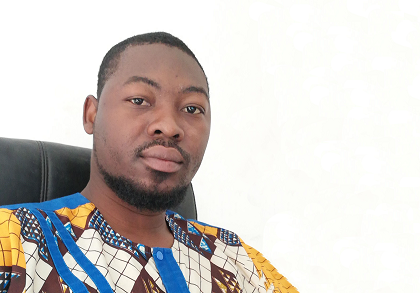
A year later, he was working as an Electromechanical Technician and became a team leader in the maintenance department at SOFAVINC, a company that creates a range of wine, liqueurs, and natural drinks in Cameroon.
From May 2013 to April 2014, Anicet moved on and worked as an electrical and instrumentation team leader in Areva, in Niger, for Satelec Fayat Group. In May 2014, he became an electrical and instrumentation supervisor at the same company, but he headed back to Cameroon, where he worked for one year.
In April 2015, he joined Fayat Energie Services International team in Mozambique as a quality engineer on the project of rehabilitation of Maputo international airport, where he stayed up to September 2017.
In September 2017, he worked as a quality engineer at Fayat Energie Services International for the Fayat Group on the Ivory Coast. He then went back to Cameroon in April 2018, to work for the same company as a quality engineer.
The hunger for knowledge never left Anicet as he was working in all of his roles. He wanted to master the technologies that he would see out in the field. So he decided to enroll in an advanced diploma with EIT.
“The course helped me to improve my work. I am more proficient in elements of safety and have an all-round better quality of work. While practically applying what I have learned from EIT, my employer always responds with satisfaction.”
He currently works as an AGL Manager at his old workplace Fayat Energie Services International, but this time he is located in Kenya. His daily responsibilities include:
- Execution and Supervision of Due Diligence Audits
- Audit Information Documentation and Processing
- Installation/Commissioning and Supervision
- Project Energy Resources
- Troubleshooting and issue rectifying
- Technical Reporting
- Implementing work procedure and quality documents
- Managing and supervising installation teams
- Ensure the respect of compliance and safety instruction
- Participate in project costing and design studies
Anicet has now set his sights on the future trends of engineering. He has recently enrolled in a graduate certificate with EIT to help him keep abreast of the developments and trends in the electrical engineering industry.
Anicet’s career has been an eventful journey, and it does not seem to be slowing down now. However, he is continuing to up-skill in his industry, so that he can be proficient in the newest technologies and have the most relevant skills. And he has not stopped dreaming.
“I think in the upcoming years, my career will be maturing, and I will be taking on more responsibility and will be in a more senior position,” Anicet concluded.
Roslyn Rountree is an Engineering Institute of Technology graduate who is obtaining a second qualification through the institute while working in the biomedical engineering field.
She completed her 52810WA - Advanced Diploma in Mechanical in 2018. She is now working through EIT’s 52705WA - Advanced Diploma in Biomedical Engineering program.
Her daily responsibilities include ensuring that medical equipment is working correctly, efficiently, and — most importantly — in a safe manner. Her job is two-pronged because she has to ensure both patient and hospital staff can use the biomedical devices.
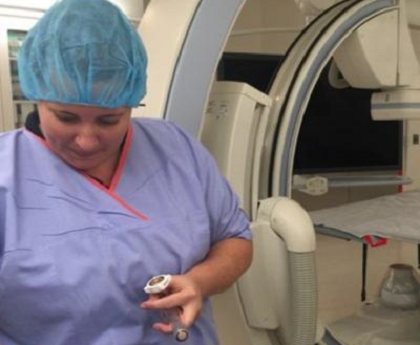
“My industry has multiple areas in which it cares for people,” she said.
“All of which are continually growing and developing every day, not only to improve patient care but also to improve how patient care is implemented.”
Rosyln’s journey has been everything but traditional. Her career initially began in agriculture. After graduating high school, she enrolled at Emerald Agricultural College. She acquired her Diploma in Beef Cattle and a Diploma in Rural Business Management.
After graduating from Agricultural college, Roslyn spent eleven years working in the mechanical engineering world. She found jobs as trade assistants in a few different mining companies and completed an apprenticeship as a diesel fitter. Worryingly, the jobs market within the mining industry was sluggish at the time Roslyn was looking for more work.
“I had experienced the roller-coaster of the mining industry more than three times,” she said.
“The last time left me looking for any job I could get my hands on as it was hard to find work within my industry at the time. On a whim and with a lot of doubts in my own abilities, I had applied for a mechanical cadetship with Biomedical Technology Services within Queensland Health.”
The cadetship saw Roslyn having to relocate from Mackay in Queensland to Brisbane in the same state. In Brisbane, she learned about surgical instruments at a workshop.
“This is where I learned multiple aspects of not only design but shaping techniques and a lot of hands-on skills from my mentor. A part of the cadetship was that I was required to study and gain an Advanced Diploma in Mechanical Engineering, which was through EIT.”
Once she graduated from the Mechanical Engineering program, not only did she gain the recognition as a Biomedical Mechanical Technician, she also felt a strong sense of accomplishment. Roslyn felt that learning theory was never her strong suit — she was more of a hands-on learner. During the course, she found EIT’s unique online training methodology, which combines theoretical and practical skill-building, was a better fit for her and helped her become a student of her trade.
After gaining insight and skills in the industry, she was ready to begin branching out and going cross-disciplinary. And as luck would have it, the branching out would take her to where her heart was: home.
“I was given the opportunity to apply for a transfer into the electrical medical aspect. If successful, I would be able to move back home to Mackay. Being successful in gaining the transfer, I was to study with EIT again to gain an Advanced Diploma in Biomedical Engineering.”
By April 2020, she will have completed her qualification. As her career matures, she predicts she will always have to have a finger on the pulse of what the biomedical industry is doing.
“Within the next five years, I will be looking forward to growing my knowledge on the workings of more specialized medical devices. You never stop learning in the medical industry, as there is always going to be new equipment, new upgrades, and continued development. So I am looking forward to seeing the growth in the years to come.”
Roslyn is now a living testament that with EIT and the determination to achieve in the engineering industry, one can take on many different roles in several different disciplines. She said EIT has assisted in facilitating her shifts between engineering disciplines.
“The engineering industry does not fit in a square box — there are so many angles and opportunities in the engineering world. Coming from a hands-on background, it allows me to use the skills in a different way and view things differently. There is no limit to where these types of industries can take you, within your own country, or even those traveling across the world.”
Hendru Coetzer is an Engineering Institute of Technology graduate who completed the 52726WA - Advanced Diploma of Applied Electrical Engineering in May 2016. It has been a twelve-year journey for Hendru, as he endeavored to learn everything he could about the engineering industry across the world.
From a young age, Hendru was obsessed with the engineering industry.
“It all started at a young age, where I used to either work with my father in his workshop or trying to assist his team at the tender age of 13. It’s in my blood. I still call my dad on a daily basis to assist with the most technical questions out there. Also, there is a certain smell to greased overalls and uncomfortable safety shoes which simply keeps me coming back for more.”
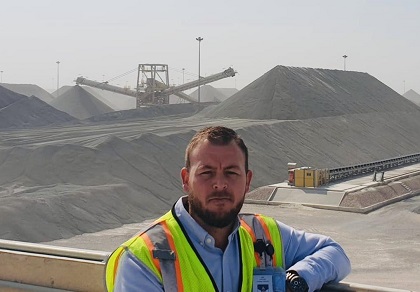 His first job was as a Junior Construction Manager at a low-cost housing project, where he began to save money in hopes that he could fund his future studies. He enrolled at a NECSA (the Nuclear Energy Corporation) training facility, which saw him develop his skills as an electrician, and millwright.
His first job was as a Junior Construction Manager at a low-cost housing project, where he began to save money in hopes that he could fund his future studies. He enrolled at a NECSA (the Nuclear Energy Corporation) training facility, which saw him develop his skills as an electrician, and millwright.
After his training, he found it particularly hard to find a job, which he needed in order to qualify for a trade test. Many months went by with no luck, but eventually he succeeded. He joined a small group of technicians at SASKO Bakeries in Johannesburg. Hendru says, due to restrictions, he was not able to get placement as an apprentice and was instead employed as a general worker with a minimal salary —and the hours were long too.
After working his shifts at the bakeries, he had enough hours to qualify. However, to take the trade test, he would have to take time off work, and he had not saved up enough money to do so. He also didn’t know if he would be prepared enough for it. He was stuck in between a rock and a hard place. Consequently, he decided to pack his bags and move to Doha in Qatar for work.
In Qatar, Hendru worked in a major mechanical, electrical, and plumbing company named Arabain MEP. For two and a half years he was an Electrical & Mechanical Coordinator on large scale projects. While he was employed, he still had a niggling feeling that he should further his education so that he could ensure success in his career.
“After completing my apprenticeship as an electrician, I wanted to increase my knowledge on an international level and found that EIT courses were the best suitable. On the platform, I found so many industry experts transferring their years of knowledge and experience through each module covered. And, because I had this course assessed successfully by SAQA (The South African Qualifications Authority), it proves the weight this qualification holds once completed.”
During this time, Hendru’s contact ended in Qatar, and instead of getting another job there, he decided to move back to South Africa to see friends and family again. He found a job in the Western Cape on a restoration project for the South African Police headquarters and a medical center. He also went full circle when he went back to South Africa — he completed his trade test. Equipped with new knowledge and skills from EIT, he says, he found the trade test to be one of the easiest exams he had ever taken.
“I truly felt the value of my advanced diploma that day. My employers reacted well to the qualification too. The course work gives you a good practical approach, which employers appreciate. You still need to prove that you are eligible to do the work and meet the high expectations that come with this qualification.”
Hendru’s obsession with engineering and working in the industry has seen him and his wife go to Sri Lanka and New Zealand, but eventually they decided to settle back in Qatar with their newborn daughter. He currently works at the Qatar Primary Materials Company (QPMC) and is in charge of mechanical equipment maintenance. His daily responsibilities include:
- Developing, modifying, testing, and evaluating all mechanical plant equipment.
- Providing technical advice about the suitability of materials and diagnosing faults.
- Advising on, planning and organizing inspections, maintenance, and repairs.
- Overseeing operational quality control processes and liaising with suppliers, customers, and manufacturing/development staff.
- Supervising the engineering and technical staff.
Hendru Coetzer is a prime example of an EIT student. He is dedicated, equipping himself with a spectrum of skills in a multidisciplinary approach to engineering. He is a lifelong learner who is giving himself skills while balancing a family and working life at the same time. We are proud to call him an alumnus of the Engineering Institute of Technology and wish him further successes in his career.
Nicola Beh is a Biomedical Engineering technician; however, her journey has not been a traditional one.
If you asked her, she would tell you that she never thought she was cut out for university life. Nonetheless, Nicola has equipped herself with the practical knowledge she needed to fulfill technical roles in the biomedical industry. Today, she walks up and down hospital wards keeping an eye on equipment due for service and spends her time repairing damaged hospital gear.
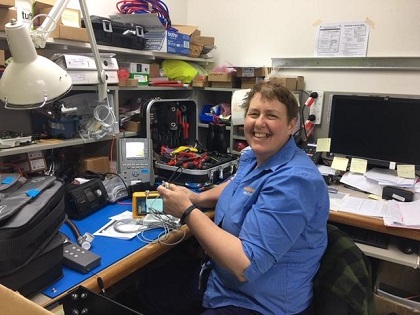
Nicola earned her 52705WA - Advanced Diploma of Biomedical Engineering at the Engineering Institute of Technology in 2018. We offer this diploma to address the immense growth of the biomedical engineering industry, which is rapidly advancing and producing jobs across the globe.
Nicola was predisposed to STEM (Science, Technology, Engineering, and Mathematics) from a young age. At school, she found that she was comfortable with physics and mathematics — other subjects completely bored her. Nicola was so dedicated to those subjects that even her English studies suffered. However, she made her way through high school and found that she had an affinity for technology.
Computer science was her specialty, but she notes that she couldn't sit still enough to be a programmer. She managed to get work in a government role in New Zealand as a trainee electronics technician. She spent time in a variety of departments picking up a host of electronics skills. However, things suddenly changed due to some government cutbacks.
“In New Zealand, the training scene was starting to change. The government was cutting costs, and training was one of the areas that cut back,” she said.
“Private industry had cut back on training as well. So, unfortunately, I never completed my training nor my New Zealand Certificate in Engineering, Electronics, and Computer Technology.
“I became somewhat nomadic and took on other roles; shop work, assembler, electronics technician, electrical switchgear fitter, machine operator, electrical apprentice, electrician, bed repair technician, renal technician, and now biomedical engineering technician.”
It was in her assembler role when she discovered her passion for biomedical technology. She started to seek employment in the biomedical field but found that many employers demanded tertiary qualifications to work in the sector.
“Before applying for the Advanced Diploma in Biomedical Engineering, I was a part-time, self-employed electrician and a contractor as a bed repair technician assistant at our local hospital. I heard about a hospital job being advertised for a renal technician to repair dialysis machines in which I successfully got the role,” said Nicola.
In her role as a renal technician, she saw the value in the practical experience that she had obtained in her several positions leading up to this one. She also realized she was way more capable of dealing with real-world situations and solving problems than she thought.
“When I followed through with an Advanced Diploma in Biomedical Engineering, it convinced future employers of my commitment to the field and that I had gained a wide field of practical knowledge and had furthered my communication skills.”
After qualifying through EIT, she finally managed to fill the role of biomedical engineering technician. She is one of a twenty member technician team that repairs hospital equipment, from simple blood pressure monitors to blood analyzers to telemetry systems.
Nicola has something she was always craving thanks to EIT: job satisfaction.
“The course has given me the confidence to self-manage my day and a heads-up on understanding how the equipment works and legislation. It has proven to me that I can do self-study in the latest research in whatever path I choose to study. I am sure I will never become bored!”
Scott Troiano has spent his career familiarizing himself with all aspects of electronics, currently working in the electronic testing, certification, and inspection industry. However, he is also an Engineering Institute of Technology graduate. With EIT, Scott has earned his 52726WA - Advanced Diploma in Applied Electrical Engineering and has now graduated a second time with the 52705WA - Advanced Diploma of Biomedical Engineering.
Like many others who have pursued engineering as their career path, Scott discovered his love for the profession in his younger years.
“I have liked tinkering with things and DIY since childhood but found, after falling into my first engineering job, a real interest in technology (specifically electronics),” he said.
“Also, I love being able to use both my brain and hands to work on solving engineering problems. I believe the engineering industry is one of the few that allows you to apply theoretical knowledge to produce real-world technologies directly.”
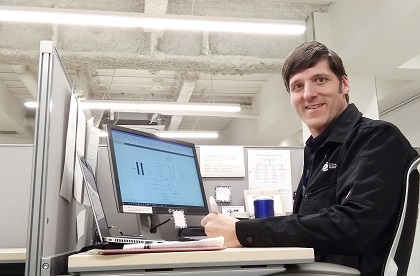
After graduating high school in 1996, Scott embarked on a four-year Electronic Tradespersons apprenticeship program that saw him gaining his Certificate III in Electrical/Electronics. During his apprenticeship, he worked for a small electronics repair shop as a Repair Technician before moving on to work for a large electrical products manufacturer as a Quality Control Officer. There, he conducted quality inspections on end products.
In 2002, Scott joined SGS Australia as a Project Officer, which saw him evaluating and conducting safety tests on electrical products, ensuring they complied with Australian standards AS/NZS. This role saw him working on power tools, fans, wiring/cable, and air-conditioners.
Scott then stepped away from work to spend a year traveling. After that year, he joined another certification body named Enertech Australia. He was working as a Safety Testing Officer, conducting safety evaluations of various products, including washing machines, household appliances, and gas cooking appliances.
In 2007, Scott moved across the world to Japan. Proving he could port his skills from one country to the next, he was able to join another certification body named TUVRheinland Japan. Working as a test engineer, Scott was appointed as a member of the equipment calibration staff. He gained experience with evaluating and testing products for IEC, CSA, EN, ANSI/AAMI, and JIS standards working on IT equipment and medical products.
“It was here that my interest in electrical medical devices began. This is also where I first gained experience in the calibration of measurement equipment.”
Before he pursued his newly found fascination for medical devices, he enrolled for the 52726WA - Advanced Diploma of Applied Electrical Engineering. EIT was one of the only institutions that offered fully online distance learning, allowing Scott to obtain formal qualifications while still working.
In 2012, Scott was on the move again. He was now working as a Project Engineer and Laboratory Maintenance Leader at Intertek Japan. It was in this role that he got his hands on medical equipment.
“Here, I focused on testing and evaluation of electrical medical devices and measurement equipment and gained experience with a wide range of medical equipment. Such as operation tables, X-Ray equipment, dental equipment, medical laser equipment, surgical cameras, microscopes, and ECG”.
Noticing that there was much to learn about the biomedical devices world, Scott felt that he required an academic approach to the field so he could master the industry. Equipped with the knowledge of his previous studying experience, he decided to enroll for the 52705WA -Advanced Diploma of Biomedical Engineering with EIT, graduating in 2019.
During that time, he managed to change roles once more. He began work for yet another certification body known as CSA Group Japan, working as a Product Safety Engineer.
“They were pleased that I was willing to study in my own time. And they were thrilled it was in Biomedical Engineering. I am studying something related to the devices we evaluate at work.”
Scott has settled at CSA Group Japan for the time being and is currently still working there. His daily responsibilities include electrical and mechanical safety testing of medical devices in a laboratory environment, evaluating technical documentation (standards, specifications, manuals), and communicating any information or findings to the medical device manufacturers. The technological development in the biomedical engineering industry is fascinating to Scott. He said:
“For me, the most amazing development in the medical device industry is to do with robotics and medical software. With these two technologies, there are numerous regulations and standards covering the evaluation of such devices.”
The multifaceted world of STEM
When asked whether he thinks people should pursue a career in STEM (Science, Technology, Engineering, and Mathematics), Scott said, “A career in a STEM industry is very rewarding - you will constantly be challenged, which helps you develop new skills constantly.”
“Also, because the skills and knowledge you gain in STEM cover a wide range of industries, there are many opportunities to discover. I believe it is really important to involve children in STEM from a young age, especially more girls, should be encouraged.”
Scott looks forward to taking on more teacher or mentor roles in his future and continuing his progress of becoming a professional in his area of expertise. We commend him for completing not one, but two qualifications with EIT and wish him well as he continues to develop his career and achieve engineering success.
Dominique Mutombo Hoyi is an Engineering Institute of Technology graduate from the Democratic Republic of Congo who is living in South Africa. He was EIT’s Outstanding Student Award Runner-Up for 2017. We caught up with him to find out what he is studying now and to see how his career is maturing with the qualifications he has earned so far.
Dominique studied the 52708WA - Advanced Diploma of Industrial Automation from March 2016 to October 2017. He is currently busy with his Bachelor of Science (Industrial Automation Engineering) with us.
He chose to study automation because he wanted to gain the kinds of skills needed for the process control field and instrumentation industry. When he got a job as a process control system engineer, he realized that he was missing the kinds of hands-on training that his job required. So, he began studying with EIT.
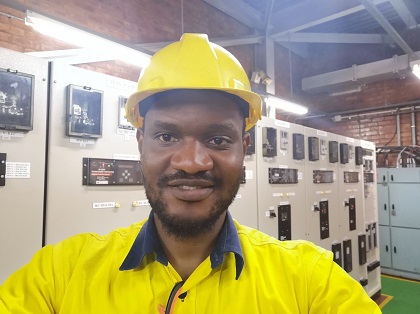
He notes that the advanced diploma helped him better his design skills and familiarize himself with control systems.
Dominique is now working as an Automation Technician at Power Plant Electrical Technologies in Nelspruit in South Africa.
“I am currently in the primary industry, which involves getting raw materials for processes such as mining, farming, and fishing,” he said.
“We are installing, testing, commissioning, upgrading, and maintaining industries like power generating plants, refineries, paper industries, water treatment plants, and mines.”
He spends his time working with technologies like programmable logic controllers (PLCs), variable speed drives, protection relays, and instrumentation and control equipment. Every day there is a new problem to solve or a fault to find, and sometimes he even has to oversee small to medium construction projects. He is also expected to complete technical surveys on electrical, control and instrumentation systems.
Dominique says the course content covered in our Bachelor of Science (Industrial Automation Engineering) has helped him a lot within his job.
As Dominique nears the end of his degree, he envisions the continuation of a fruitful career in the automation space.
“My future vision in my current position is to become a great senior process control and automation engineer; then later, I can join the engineering management within a well-known organization. The project engineers I work with are inspiring — they can solve complex problems in networking, control, power circuits.”
Ishmael Muumbe is a two-time, verging on three-time, Engineering Institute of Technology graduate. He studied both his 52708WA - Advanced Diploma of Industrial Automation and 52726WA - Advanced Diploma of Applied Electrical Engineering through EIT after having moved from Zimbabwe to New Zealand to train as an electrician.
Now a technologist, Ishmael is working within the mines in Western Australia and is embarking on a journey of furthering his skills and education in the electrical engineering world. Ishmael’s story is one of looking for opportunity wherever one can find it, and balancing studies, work, and family life.
Ishmael finished high school at Ascot High in Gweru, a city located in central Zimbabwe. At school, he found that he had an affinity for science subjects. After graduation, he had the chance to do an apprenticeship at a Zimbabwean Alloys Chrome Ore smelter plant in Gweru. There he trained as an Electrical Apprentice.
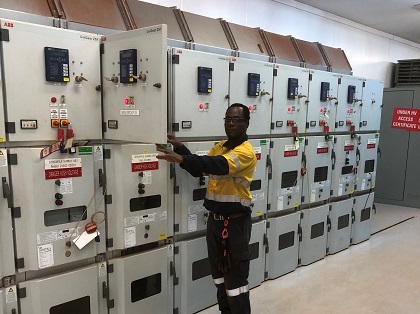
With the expertise that he acquired from working at the plant, Ishmael decided to explore getting electrician jobs in Zimbabwe. Soon, he was working as an electrician.
For a couple of years, he worked as an electrician, but as he kept working, Zimbabwe began suffering a reversal of economic fortunes. Ishmael consequently decided to relocate to New Zealand to seek greener pastures where he would better be able to develop his skill set. Soon, he found himself in a new country with a rapidly advancing technological industry.
He said, “coming from a third world country, I realized that the technology in electrical engineering was so dynamic and to keep up, I had to further my education. That was not going to be an easy task — finding studies that I could do while working full-time and while providing for my family.”
Ishmael began researching distance learning institutions that could assist with growing his knowledge while gaining the practical experience he was hoping to acquire through working in New Zealand. Soon, he stumbled upon an institution that fit his needs: the Engineering Institute of Technology.
He enrolled for the 52708WA - Advanced Diploma of Industrial Automation and followed that up with a 52726WA - Advanced Diploma of Applied Electrical Engineering. The two qualifications have equipped him with the skills necessary to deal with the automation making its way into the electrical engineering industry.
He then took advantage of the mining boom in Western Australia. He currently works in the mines for Fortescue Metals Group in the Pilbara region in WA. His daily responsibilities include service, repair, and maintenance of the electrical mining processing plant. This consists of all of the crushers, conveyor systems, and all associated automated equipment.
“Studying online has made me manage my life in a great way. I enjoy work life, family time, and study time at the same time. It’s not always easy to study online though. One must develop great time management skills, especially to ensure you stay on top of your studies.”
Ishmael says he would encourage any young person to pursue a job in science, technology, engineering, or mathematics (STEM) industries due to engineering’s role as the backbone of technological innovations.
“The studies I have completed with EIT have made me appreciate and understand how electrical engineering and automation merge,” he concluded.
Ishmael has enrolled for the Bachelor of Science (Electrical Engineering) with EIT, which he will be starting in early 2020.
Shkumbuzo Khoza is an EIT graduate from South Africa.
He first began his career in the engineering when he graduated from Evander College, studying his N2 through to his N6 certificate. This meant that he had successfully obtained a national technical certificate with special focus on electro-mechatronic engineering, certifying him as a millwright.
Shkumbuzo tried to get a millwright learnership but was unfortunately not successful in doing so. However, he vowed not to give up and would keep looking for avenues to develop his career.
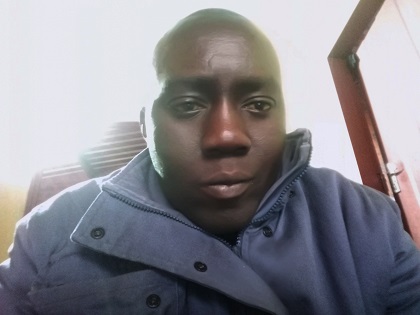
He then succeeded in obtaining a learnership from the country’s energy parastatal Eskom. There, he became a plant controller and discovered his passion for the electrical engineering field. In 2009, he partook in a trade test where he was declared competent on his first try.
He was then hired by a company named MCB Switchboards where he dabbled in electric panel building and wiring. The job provided many learning opportunities for Shkumbuzo. He said
“I gained a lot of experience working from different companies such as Sasol, Vodacom, fertilizer and food industries - where I am today.”
In 2013, Shkumbuzo decided to get his wireman’s license. But, he wanted to continue advancing in his career. In 2016, he joined the Engineering Institute of Technology where he enrolled in our 52726WA - Advanced Diploma of Electrical Engineering (Power Distribution).
“The course helped me understand most of the stuff that was happening in the world when it came to the electrical world of technology. I learned about high voltage and protection systems,” Shkumbuzo said. “I would like to say thank you to EIT for the powerful course that has helped me shine.”
Shkumbuzo hopes to continue his academic journey and pursue a Bachelor of Science in Electrical Engineering to ensure that he keeps building on his already busy career.
Jacques Esterhuizen is an Engineering Institute of Technology graduate from South Africa, who earned his 52810WA - Advanced Diploma of Mechanical Engineering in 2017.
“I was always interested in engineering from a very young age. I would disassemble and assemble equipment all the time. My father was an electrician, a superintendent and building contractor — he was the one to expose me to the industry.”
After completing high school, Jacques went on to the University of Stellenbosch and completed a four-year Bachelor of Engineering (with Honors) in Electronic Engineering in 1992. Soon after, he began working in the water industry and was exposed to the automation technology involved.
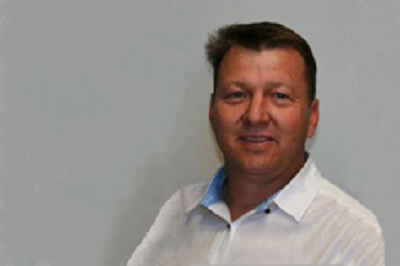
“I installed and maintained SCADA, telemetry, PLC, and automation systems. I integrated and interfaced to pumps, valves, blowers, disinfection units, dosing, compressors, and instrumentation to provide monitoring and control solutions to operational staff, maintenance teams, and management.”
What he had learned equipped him so he could fill a position in the city council in 2005. He worked on the “optimization and improvement of screenings, compactors, grid removal, aeration, sludge treatment, and drying and pumping systems” at the city council.
After many years with the city council, he became an engineering consultant in 2015. Seeing technological developments occur in the engineering world throughout his career, Jacques decided to further his studies to become a reliable practitioner in two engineering disciplines.
He decided to pursue mechanical engineering and began his research to find a program that suited his needs.
“I felt it was important to know and understand the intricacies of mechanical equipment, especially when interfacing to it to provide automated solutions. I already had field experience, but theory was as important. The challenge was to study during full-time employment.”
That is where the Engineering Institute of Technology came in. He decided that while he worked as a consulting engineer, he would study via EIT’s innovative online platform.
“Another reason for selecting EIT was the program structure which included AC motors and drives, HVAC, process plants and piping, energy, efficiency, renewable energy systems, industrial automation, measurement and control systems, and project management. Those modules were a great value to my career, and I could apply the knowledge in my work.”
After graduating with the Engineering Institute of Technology, Jacques noted that his work and his abilities as an engineering consultant strengthened.
“I am currently involved in the design, construction management, and supervision of many HVAC, building, pump station, telecommunications, and renewable energy projects.
“I am responsible for managing various building, construction, and engineering projects.
“The knowledge gained from studying at EIT and the University of Stellenbosch, combined with practical experience, proves valuable in my career as an engineer and project manager.”
Jacques summarizes his time with EIT by outlining three elements he has gained since graduating: improved skills, capabilities, and confidence levels.
Gaston Kausa is an Engineering Institute of Technology graduate from Zambia who earned his 52724WA - Advanced Diploma in Civil and Structural Engineering. He felt an instant connection to engineering when in high school he was introduced to the technical drawing subject.
“I fell in love with the subject,” he said. “From then on, my mind was made up that my career was going to be in the engineering industry.
What followed was a lifetime of acquiring skills and qualifications to validate his love for engineering and transform him into the professional he is today. Today, he is a member of the Engineering Institute of Zambia.
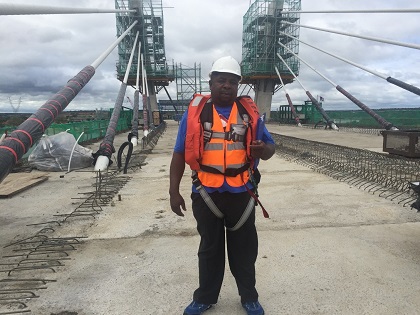
Gaston’s working life began with a job as a surveyor at Zambia Consolidated Copper Mines in 1985.
Throughout his career, he has worked as Chief Surveyor at many infrastructure projects in Zambia and Namibia.
Since 1990, he has worked on a total of 15 separate projects filling roles such as land survey assistant, surveyor (sometimes being the senior on-site), chief draughtsman, chief surveyor, site manager, sub-contractor, and project surveyor.
He has operated as a surveyor for key industries from Namibian and Zambian mines, to railways, main roadways, parking lots, and bridge projects.
He recently chose to do the Advanced Diploma course through EIT because he had his eyes set on practising as a Civil Engineer.
“As a surveyor, I have been working closely with civil engineers for a long time,” he said.
“Over the years, I have acquired a lot of civil engineering knowledge through practical experience. This course enables me to practice as a civil engineer and utilize the knowledge I have acquired over the years. It has advanced my understanding of the best industry practice and enabled me to perform more complex tasks in design and construction.”
He is currently working in the construction industry, employed as a surveyor engineer for consultancy services. In this role, he oversees the design, tender documentation, and supervision of the construction of the Kazungula Bridge Project.
Upon completion, the bridge will form a 923-meter-long link between Kazungula in Zambia and Kasane in Botswana. It is to be completed in the last quarter of 2020.
Adding to the arsenal of skills Gaston already possessed, studying through EIT further augmented his understanding of the civil engineering industry.
Gaston had already amassed considerable geological draughting and mine surveying qualifications from the Zambia Institute of Technology and the Copperbelt University respectively between 1983 and 1998. In 2008, as automation really began creeping into industry, Gaston studied a certificate in AutoCAD at Intec College in Cape Town, South Africa.
“Technological advancement has been the most fascinating development in the construction industry. From Computer-Aided Design software to drone technology, the industry has seen massive transformation in terms of efficiency and speed of delivery of projects.”
While he would like to continue his education in the future, he is absolutely happy with the progress that he has made so far in his studies.
“Things are looking bright. I am beginning to appreciate my job more and hope to be a practising civil engineer after registration with the relevant authorities. I expect a big leap in my career when I combine my vast experience with my new qualifications from my new qualification from EIT.”
Gaston says that in five years, he would love to be in a more senior construction management role and be a construction industry expert that can implement successful end-to-end project management.
Fortune Chipeta was born and raised in Bulawayo, Zimbabwe. He earned his 52708WA - Advanced Diploma in Industrial Automation with the Engineering Institute of Technology between 2014 and 2015. The Advanced Diploma is now one of many qualifications Fortune has amassed across his engineering career.
Fortune loves the world of engineering, particularly in the electrical realm. However, he was quick to discover that automation was revolutionizing the industry he had always adored. He is now working towards that dream of being an engineer in the exact cross-section where electrical engineering and automation meet. He says:
“I love making and implementing practical solutions to everyday problems and electricity and technology fascinates me.”
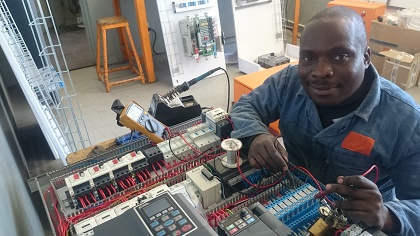
After graduating from high school, he enrolled for a National Certificate in Electrical Power Engineering at Westgate Industrial Training College. A straight-A student in high school, Fortune passed the 3-year course with distinctions in 2004. During that time he was posted out for a one-year industrial attachment at Bulawayo Cold Storage Company. He says:
“It was during this time working on the then state-of-the-art abattoir that I fell in love with industrial controls and electrical systems.”
In 2005, Fortune enrolled for a full-time National Diploma in Electrical Power Engineering at Bulawayo Polytechnic College. It was there that he furthered his knowledge of industrial electronics, digital electronics and control systems.
Fortune then made the move to live in South Africa, finding a job in the construction industry as an installation electrical on commercial building sites. He said:
“This was a very enlightening period in my career as I totally deviated from my dream of a future in electrical, but I gained exposure in home automation systems. In 2009, I got an opportunity at a steel company as an industrial electrician and was back into an industrial environment”.
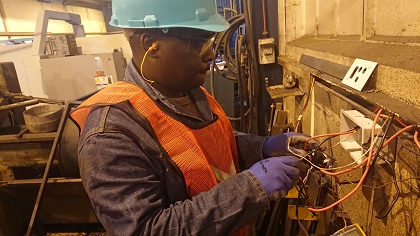
Change of fortune
Fortune had reached a crossroads. He was gaining practical knowledge but still wanted to future-proof his career. Suddenly, the answer became clear. He said:
“In 2014 I heard of the Engineering Institute of Technology from a friend. It was a good solution to my hectic professional life. Naturally, I enrolled for the Advanced Diploma in Industrial Automation as that’s what I was passionate about”.
Fortune is currently employed as an Industrial Electrician and Automation Technician. His daily responsibilities include factory maintenance and electrical projects. He assists and leads a 12 man team who provide solutions to any problems that may arise whilst perform the aforementioned tasks.
As Fortune continues to work hard at furthering his career, he tries to display the best version of himself in the workplace so others can learn from him. He concluded:
“After EIT, everything is much easier to understand now and solutions to challenges come effortlessly. Now my employers marvel at the ease with which my professional abilities have improved. I am definitely aiming to be the best there is in Industrial Automation and be able to inspire young industrial technicians.”
Simona Capparella comes from a family of engineers in Italy. From a young age she was destined to follow in her father’s footsteps and work her way up to being a reliable, dynamic female engineer.
“My father is a very respected engineer in my hometown, he was a teacher and started a career as a design engineer in Italy in 1990,” she said.
“Both my father and uncle were electrical systems teachers. They were the people who encouraged me to study engineering, and instilled a great love for this subject in me.”
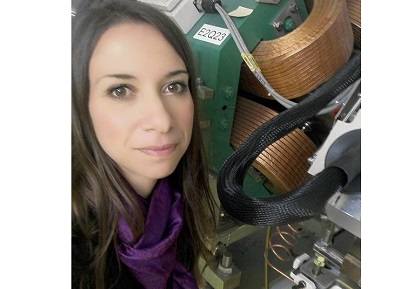
Today, she is a senior electrical engineer in the building services industry. It has been quite the journey to get where she is today.
At the age of 16, Simona enrolled in an engineering high school in Italy where she studied electrical systems.
In 2008, she acquired an Honors degree in Safety and Protection Engineering in Rome, where she mainly studied Chemical Processes Engineering and Fire Protection Engineering.
Upon completion, she moved on to her master’s degree and began working as an electrical designer in the building services industry with her father, who mentored her in the profession.
“I earned my master’s degree in Safety and Protection Engineering with a focus on Safety in Electrical systems in 2012,” she said.
“I then started a second master’s degree in 2013 in Electrical Power systems.
“In 2015, before finishing my master’s, I decided to move to the United Kingdom to expand my engineering knowledge and work on international high profile projects.”
Her move saw her lending her skills to projects in Oxfordshire. She got an offer to work as electrical designer at ISIS Neutron and Muon Source, one of the most famous neutron spallation research centers in the world.
During that time, she enrolled in the EIT Professional Certificate of Competency in Substation Design (Control and Protection) while weighing up her career options.
“I wanted to work in a commercial environment,” she said.
“At the time I wasn’t sure whether I would like to go back to the building services industry or start a new career in the power systems sector.
“Either way, I felt that in order for me to be more competitive in the market as a professional I would need to deepen my knowledge of substations, and in particular, earthing systems — which is a topic that has always fascinated me.
“The best way to achieve this was to attend an EIT course. Completing the EIT course definitely boosted my prestige as an electrical engineer.”
Two years ago, Simona decided to apply her electrical engineering skills to the building services industry.
She is currently working in Manchester in the United Kingdom at a company named BDP. It is a major multidisciplinary practice, of architects and engineers, which works in several building services sectors.
The qualification from EIT gave her CV the push it needed to rise above the rest.
“I believe that the EIT Substation course gave my CV a certain visibility in the pool, and helped me during the selection process for my current job”
She is also a contributor to the STEM Ambassador Programme in the United Kingdom, a position which she uses to encourage young people to pursue engineering careers.
EIT is thrilled to have been part of her journey and wishes in both her current and future endeavor.
Lonwabo Busakwe is an Engineering Institute of Technology graduate. He is working in the Renewable Energy industry, particularly within the wind turbines space with a company named Nordex and Acciona Windpower. He completed his 52726WA - Advanced Diploma of Applied Electrical Engineering (Power Industry) with EIT.
His daily responsibilities include the service and maintenance of the wind turbines, the troubleshooting of electrical and mechanical faults, checking the SCADA systems, and generally working with electrical software tools.
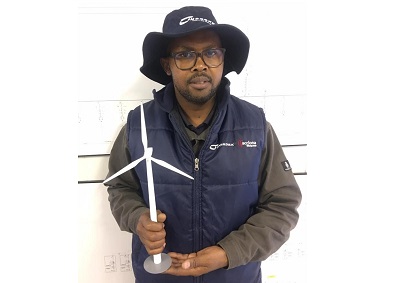
Renewable Energy is a relatively new area of expertise for South Africa. The country’s energy sector is largely made up of coal power plants — which makes up 70 percent of the country’s mix.
Experts are calling for independent renewable energy power producers to flood the energy sector to teach and train South Africans in the way of new clean forms of energy.
Seeing an opportunity, Lonwabo sought out the Engineering Institute of Technology. He wanted to grow his skill set so that he would be prepared for the oncoming energy revolution in the country.
“For me, engineering is one of the career paths I liked most,” he said. As a result, Lonwabo has also begun studying EIT’s 52764WA – Graduate Certificate in Renewable Energy Technology.
“It brings out the best in me. I enjoy solving technical problems and thinking strategically.
“The Renewable Energy Industry is new in South Africa, so it’s very challenging and interesting to me. I am learning a lot of new engineering concepts.”
Lonwabo encourages young South Africans to follow in his footsteps and study a diploma or degree that can help them elevate themselves and help power South Africa. Lonowabo is now considering pursuing a Bachelor of Science in Electrical Engineering.
In the meantime he has acquired a Post Graduate Diploma in Project Management. He is currently busy with his master’s degree in project management with only one module outstanding.
“The Advanced Diploma of Electrical Engineering has changed my life a lot, now I have the confidence within the electrical engineering industry because of the new skill set I have gained from EIT. My career is very promising and it looks so bright with this international qualification which I have obtained.”
Ronil Shama is a recent Engineering Institute of Technology graduate. He earned his 52708WA - Advanced Diploma in Industrial Automation, adding qualifications to his CV and growing his skill set. He knew he needed to study Industrial Automation because he saw the face of the mining industry - the industry he has spent his entire career in - changing.
He started his career back in 1996 in Fiji where he was studying Electrical & Electronics Engineering at the Fiji Institute of Technology. During that time, with mining being an integral part of the Fijian economy, he was working with Emperor Gold Mining Company at the Vatukoula mine as a shift electrician.
In 2003, he went to work for Highway Electrical Limited in New Zealand where he filled a position as an electrician. In 2007, another career opportunity reared its head, which saw Ronil going to Mount Isa in Australia. There, he worked for Xstrata mine under Downer on a few projects.
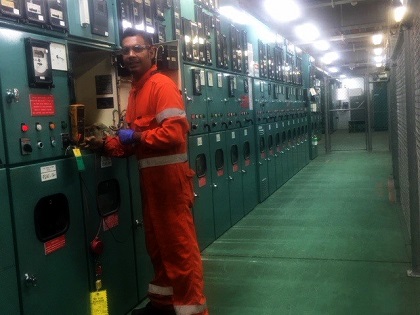
He is currently working for Rio Tinto at the Ranger Mine in the Northern Territory. His daily responsibilities include preventative maintenance, preventing breakdowns, power generation and distribution, and project safety. He also works to improve the plant and make it more efficient, while coaching peers and supporting the engineering teams at the plant in general. Where he works, they have been mining Uranium in the middle of the National Kakadu Park for a couple of decades.
Ronil saw how technology began flowing into his workplaces in recent decades, and reckoned that he needed to stay abreast of the technologies flowing into the industry. He said:
“In order to study plants, their capabilities and their technologies, one needs to have a better understanding about systems. Hence, it was a no brainer to pick this course to advance and improve my understanding about such technologies.”
As automation has made its way into the mining sector, Ronil has been surprised by the technology that has come with it. However, he says that the newer and the older technologies work in tandem. Thus, Ronil has to be well acquainted with the old, and figure out how to control the new. He said:
“Our power station is 40 years old and we still have relay logics incorporated with Rockwell PLCs still operating our plant. We have DCs, PLC 5, Modbus, and newer Micrologix 500 systems in place. We have old and new technology combined to get optimum results. Technology has advanced so much in the last twenty years. It is fascinating as well as challenging for me to acquaint myself with new and old technology at the same time. Mastering these together helps me to achieve great output and results.”
Ronil has just signed up to the 52764WA - Graduate Certificate in Renewable Energy through the Engineering Institute of Technology. He is setting his sights on being a fully licensed engineer and furthering his career. He said:
“If I manage to complete my graduate certificate in renewable technologies, I can work as an engineer in renewable sectors given my experience in the heavy industrial and power generation field.”
Festus Tawii was born and raised in Namibia. He is currently working for his country as a DC technician at NamPower, Namibia’s power utility. He is also currently studying with the Engineering Institute of Technology.
Festus’ story is one that speaks of rising above the odds and achieving success no matter the circumstances. He said, “I always wanted to be an electrical engineer, but did not have the finances to become one.
“My mother and my father could not afford for me and my older brother to both study. They helped my brother financially, but I had to take a vocational training route with help from a government bursary.”
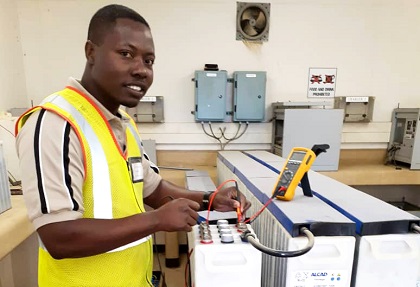
He went to study general electrical courses at the Namibian Institute of Technology. Because of the practical nature of the technical vocational qualification, the institute sent Festus out on a six-month job attachment. A job attachment provides the tertiary student with the opportunity to combine what is being taught in the qualification with actual work experience.
Festus was an apprentice at a few companies before he settled at NamPower, Namibia’s national power utility. He takes pride in his role as a DC Technician at NamPower because the utility keeps the lights on for its citizens.
His daily work sees him providing assistance with the standby and storage protection equipment, ensuring that it is deployed when needed. This equipment is used to keep the power stations running if there is an electricity trip or outage.
Festus is currently studying the 52726WA - Advanced Diploma of Applied Electrical Engineering at the Engineering Institute of Technology, completing his modules whilst working at NamPower. He also seems to be setting an example for his colleagues.
“My colleagues became very interested in what I was studying,” he said.
“I showed them what it was all about and now eight of my colleagues are enrolling with EIT. I am convinced that it will help everyone develop their knowledge and skills, and get them better positions in the workplace.”
Festus sees himself in a senior managerial role one day but knows there are more qualifications to acquire before he achieves this. Apart from the eight colleagues, Festus has already influenced, he recommends that more young people look to institutions like EIT that can help them succeed in their careers.
However, he says that not everyone follows the same path. He says that the government might not always be gracious enough to award a bursary to someone and that there are many pathways to success.
“There are steps that a person can take as I did. Starting with vocational jobs and studies, and then upskilling yourself with the money you have made. You need to start somewhere. Even if you are starting from scratch, you must keep your head up and keep going.”
Sam Bates is a graduate of the Engineering Institute of Technology who recently earned his 52708WA - Advanced Diploma of Industrial Automation. He works in the automation industry in the United Kingdom and is employed as a controls engineer. But, it has been a journey to get to where he is today. Sam says:
“I left school at the tender age of 16 and went to engineering college to learn the very basics in engineering. While I was there, I got offered an apprenticeship at a local engineering company called Finishing Design Services. They build special purpose machinery and wanted to employ me as a panel wirer with the option to progress in future years if I had the right attitude.”
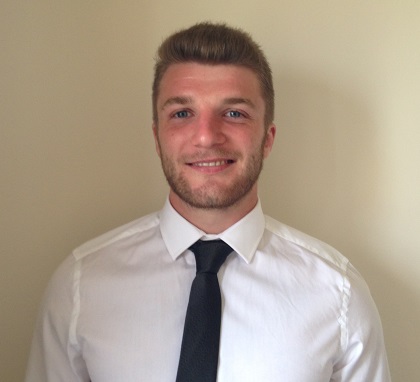
Leaving school as early as he did, and needing experience, he took the apprenticeship. He would go on to be a panel wirer for four years while he completed his National Vocational Qualification (NVQ) and apprenticeship.
“As promised, the company offered to pay for me to complete a HNC in electrical and electronic engineering at university for one day and evening a week for two years. I accepted and continued to develop, now doing more skilled work at my company, such as editing electrical drawings, powering up machinery and getting introduced to software.”
Once he had completed his Higher National Certificate (HNC), he decided to slow down on studying and continued to gain work experience and develop his skills in the workplace. He began designing the electrical schematics for small projects and writing PLC software for them.
He spent seven years at Finishing Design Services and was ready to move on. Sam moved to London. There, he worked as an engineering technician at a company named Suncombe Ltd. The company manufactures process machinery. However, he had a feeling that the qualifications he had earned were not quite enough to reach the career aspirations he had.
“I progressed within that company to commissioning the software and servicing existing machinery. This is where I decided to take up the Advanced Diploma of Industrial Automation to develop my knowledge.”
Upon graduating from the course, Sam was looking to level up once moreso he began looking for controls engineer jobs. He eventually landed a job at a new company named ATM Automation.
He has since been with the company for six months, writing and commissioning software for automation machinery.
Sam believes the engineering industry has changed his life and encourages young people to heavily consider going into engineering. He said:
“I cannot understand why young people do not want to jump into any kind of engineering type of work. I would encourage young people to get an apprenticeship once finishing school, or after their A levels* - and to study part time while they work. This would give them the practical experience that employers desire and the opportunity to develop their knowledge.”
Equipped with his Advanced Diploma, he is confident in his job and ready for more challenges that the engineering industry can throw at him. As he continues growing his skill set, Sam expects to become a senior controls in engineer in the next ten years.
*a public examination requiring advanced knowledge in a subject and taken at the end of secondary school in the United Kingdom.
Jessica Ann Mckenty is an Apprentice Communications Technician at Ergon Energy. She is a noteworthy graduate of the Engineering Institute of Technology. In October of 2018, Jessica graduated with a 52782WA - Advanced Diploma of Industrial Data Communications, Networking & IT.
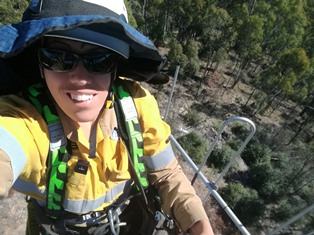 Jessica completed the Advanced Diploma in the final eighteen months of her apprenticeship at Ergon Energy. Through her academic endeavors and her apprenticeship, Jessica became equipped with everything she needed to make sense of the industry she was entering into. She said:
Jessica completed the Advanced Diploma in the final eighteen months of her apprenticeship at Ergon Energy. Through her academic endeavors and her apprenticeship, Jessica became equipped with everything she needed to make sense of the industry she was entering into. She said:
"I have been fortunate enough to get exposure to a wide range of applications of communications. This includes fiber splicing, tower rigging, mobile vehicle installation, radio communications maintenance and installation. I have also worked on upgrades of protection signaling paths (microwaves and fiber), removal of old SACS systems and installation of RTU's in their place, as well as installing and configuring communications modems and switches at remote sites."
Previously, Jessica had acquired an Electrical Trade certificate and had a reasonable grasp on some of the necessary information in her industry, but she says the Advanced Diploma presented her with ‘greater understanding and appreciation of industrial data, communications, networking and IT.'
“The highlights of the course would have been the DNP and SCADA modules, as many faults I encountered in my work involved these topics. Once I was able to breakdown the knowledge provided by EIT and use it in my fault finding methods, I did feel a sense of success.”
The fault finding, Jessica says, was made more accessible through the first four modules of the course: Physical Media, Industrial Data Coms, Wireless, and Ethernet. It was all systems go after she began familiarizing herself with the kinds of systems she came to know through her studies. She had newfound confidence when working at configuring switches and modems.
However, Jessica did find some aspects of the course difficult; specifically, the group work aspect of it. Being used to traditional ways of learning, Jessica found that the online method of learning that EIT provides took some getting used to. But soon after, she realized that she could re-watch lectures and found written summaries of past webinars.
Nonetheless, Jessica notes that she really thrived in her work while working through her Advanced Diploma. Her future outlook is one of ultimate optimism. She said:
"In relation to career progression, I feel I am a more valued member of my workgroup. The foundational knowledge that this course provides is priceless. I have been successful in being signed off early as to take on a Communications Paraprofessional role within Ergon, and I look forward to continuing my studies and having a successful career in this field.”
Jessica is considering studying towards a CISCO accredited course or pursuing an advanced networking course to further her knowledge in network operations. Equipped with the skills and the know-how thanks to the 18-month Advanced Diploma, Jessica feels that she is exactly where she needs to be — building a career in the engineering world.
EIT would like to honor her for never giving up on her course and persevering. That is why she is a runner up finalists of our EIT Graduate of the Year 2018. We hope she continues to take her engineering career from strength to strength and succeeds in everything she does.
At the end of the 80s, in the far west of outback New South Wales, in an inland mining city known as Broken Hill, Cindy McGeorge embarked on an Electrical Fitting apprenticeship. And now, with a 52726WA - Advanced Diploma of Applied Electrical Engineering, she is an alumnus of the Engineering Institute of Technology.
Her life has been defined by becoming a mother, relocating, pursuing further education and her dreams in the electrical engineering industry. What follows is an interesting window into the world of a woman in the energy distribution world.
After her apprenticeship Cindy worked both above and underground at the local mines in Broken Hill and graduated to working with the mines’ SCADA systems. After spending some years there she felt it was time to move on. She said:
“After 10 years I went to work in the south west Queensland oil and gas fields as a contractor as well as working part time on a cattle station. I was lucky during this time to give birth to two boys. My eldest child and his nanny would travel with me to my jobs. When the second boy came along, it was time for a change.”
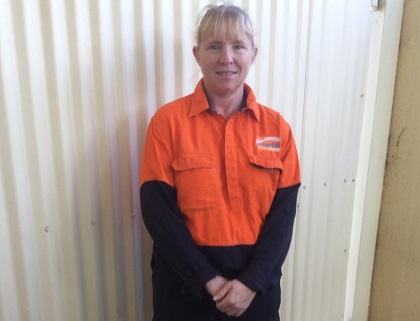
Cindy moved to a nearby town, Tibooburra. She continued to contract on a smaller scale, but also spent time raising her children and running a local shop.
But she was due for another shake-up. She said:
“After a few years in Tibooburra, I found myself contracting to the local utility Essential Energy and this turned into a casual position. Some of my jobs included all remote meter reads, fault and emergency work and meter installation.
“After 6 years I relocated to obtain a full-time position within Essential Energy, but also to access a better education for my children. This landed me in a town in the middle of New South Wales, where I continued as a full-time Electrical Technician with the distribution company.”
She then began studying through the Engineering Institute of Technology to further her knowledge and skills. She has since moved to Griffith in New South Wales, and is excited to see what the future will bring.
Cindy notes that it is interesting to see how technology is transforming the industry she has come to know and love. She adds that the introduction of small and large-scale solar and wind energy projects have been an impressive and exciting addition and believes these advances will, and should, attract young, passionate people to the electrical industry.
Cindy is not stopping or slowing down. She is determined to achieve great things, and further her career in engineering. She concluded:
“I have spent 30 years in the trade and always had a passion to do things better and different. Engineering will hopefully open the doors that can allow me to achieve this. With the aid of more study, I will see myself move towards a job that allows me to be creative and productive.”
All of us at EIT wish Cindy everything of the best. We know that her career will continue to be defined by the passion she brings to her work and her further studies.
Douglas Black is a graduate of the Engineering Institute of Technology. He recently completed his Advanced Diploma of Industrial Automation and was a perfect candidate for online education and training.
Douglas currently works in the iron ore mining industry. His daily responsibilities include controlling one of the world’s largest bulk ore loading facilities — which pertains to control system governance, fault finding and general maintenance, and productivity improvements.
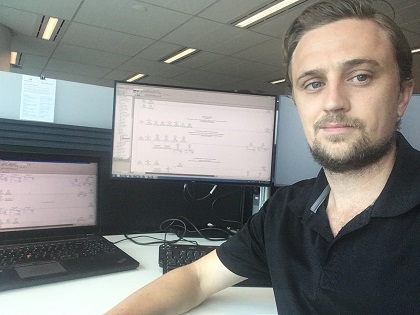
Douglas left school halfway through twelfth grade to start an apprenticeship as an Electrician in the Mining Industry of Western Australia. He said:
“At this time I was living in Kalgoorlie. It’s the heart of the Goldfields in Western Australia. Most boys my age were encouraged to get apprenticeships as at this time the mining industry was booming and there were plenty of jobs.”
After he finished his apprenticeship in Kalgoorlie, he began working on a fly-in fly-out (FIFO) basis on projects in Pilbara, the iron ore mining capital of the world. During this period he grew to love the control system side of the trade: PLCs, motor control, and automation.
After several years of working in iron ore, he began working for world renowned, global mining group Rio Tinto at Argyle Diamond mine.
“This is where I decided I wanted to further my education and move into engineering. My supervisor at the time was completing distance education and strongly recommended I do the same to chase my passion. I began an Advanced Diploma of Automation.”
He then moved to Port Hedland and began working as a technician for BHP. During his time there, he utilized EIT’s novel online education and training system to work towards graduating and acquiring his qualification. On his days off, he would work with the Control Systems Engineering team at BHP Port Hedland - learning more about the industry he found himself in.
After he completed his Advanced Diploma, and with the experience he gained with the Control Systems Engineering team, he applied to be a Control Systems Engineer in the company. He was chosen for the role and has been in that position for the last year. He said:
“I’ve found the Advanced Diploma helped greatly, not only by assisting me get the job I do now, but assisted me in learning in all areas of the controls world, including communications protocols, which until then I had very little exposure to. It has helped me in my day to day activities as well.”
He has since begun his Bachelors of Science in Industrial Automation through EIT and is expanding his skills in his ever-growing career. Douglas’ fascination with automation is not over; he believes it will make a safer and more productive workplace. Douglas concluded:
“I always loved to be challenged. One of my earliest bosses told me, ‘the day you stop learning should be the day you die’. I feel there is no better career to be in that makes that quote stay true. I’ve now got the job that I have been aiming for, but didn’t think it was achievable for another 5 to 10 years. I am in love with my work.”
Algate Panyika Mtemah is an Engineering Institute of Technology born and bred in Zimbabwe. He is currently working in the Metal and Minerals Processing Plant industry. He studied EIT's 52724WA - Advanced Diploma in Civil and Structural Engineering. To say he has done it all is an understatement.
He is fond of the application of knowledge in innovative engineering design, construction, operation, and maintenance. His daily responsibilities include quantity costing of mining project processing plants.
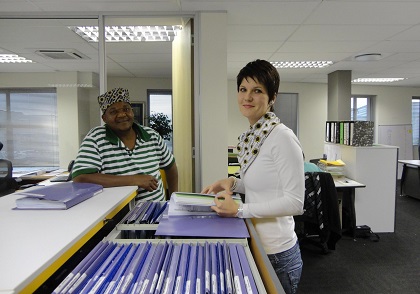
Algate loves witnessing the building of mining plants from scratch, seeing the final product and seeing it ready to be sold on the market. He is fascinated by the interdisciplinary fashion in which the industry operates. He says you can expect to see all sectors at work: civil, mechanical, industrial, electrical and chemical engineering.
Algate has enjoyed a wonderful career of employment and on-the-job learning — while also studying towards achieving recognition in the engineering industry.
He spent his tertiary education years at Bulawayo Polytechnic to pursue a Mechanical Engineering Diploma in the 1990s. He got a job while studying at a foundry and engineering company named Issels in Bulawayo, then as a mechanical engineering technician.
After he completed his diploma, he joined Portland Holdings as a technical engineering officer — where he worked for many years. He then relocated to Harare, the capital city of Zimbabwe, and started his own company in the engineering field.
Around that time, the Zimbabwean economy began struggling. Algate reflected:
"Due to the economic meltdown, there was high inflation in Zimbabwe at a stage. I was left with no choice but to go back to 8am-5pm full-time employment."
He joined a company named Cochrane Engineering as a senior estimator in 2000 and worked extensively in the boiler manufacturing industry until 2008. He relocated to South Africa in the same year. He joined a company in the Western Cape Province and started work as a technical buyer at Gascon - a pressure vessel manufacturing. Inside the company, he worked extensively in the department that was responsible for acquiring gas containers.
Opting to relocate once more, he moved to Richards Bay in KwaZulu-Natal in South Africa. He joined a company named MKA Chartered Quantity Surveyors. He then moved on to Richards Bay Minerals as a junior quantity surveyor, assisting with the complete overhaul of one of their furnaces.
A year later, in 2009, Algate joined Kentz Engineers and Constructors as a quantity surveyor in electrical and instrumentation. He spent a year there as well, and upon the completion of the Richards Bay Minerals Tailings Treatment Project, he obtained a position in the Middle East.
He began work for a company named Prolog Construction, based in the United Arab Emirates. He once again found in a quantity surveyor role, but this time in the civil engineering department. Algate flexed his ability to learn quickly, becoming proficient in the world of concrete structures during this time. He was, in this time, a part of the crews that built NATO hostels in Afghanistan within the NATO Military Fraternity - work that kept him occupied for the extent of 2011.
In 2012, he went back to South Africa. He joined SENET as a senior estimator in the metal and mineral processing plants - where has been working until today.
Graduation
During his tight work schedule, Algate also managed to graduate through EIT’s 52724WA -Advanced Diploma of Civil and Structural Engineering course. He became one of our Honorary Students of the Year 2018. Nobly, Algate, amidst Zimbabwe’s politically and economically complicated 2018, assisted students with transferring money from Zimbabwe to South Africa to pay for their tuition fees. Talking about why he took the course, he said:
"I chose this course specifically to gain in-depth knowledge about construction as a whole in regards to concrete and structural engineering on how they marry each other in the formation of a firm structure."
Algate is set to relocate to Australia to further develop his skills and grow his knowledge of civil engineering and structural projects. At the same time, he says he will be pursuing his studies further with the Engineering Institute of Technology. Algate is a valued member of the EIT alumni and are immensely proud of his achievements in his career and in his studies. 2019 is his for the taking! Talking about his future, Algate said:
“I see myself advancing and soaring high like an eagle in whatever I embark on at any stage within my career and become a well recognized Professor."
Mildred Nanono is a Control and Instrumentation Engineer at the Nalubaale and Kiira Power Stations, maintained and operated by Eskom Uganda Limited (EUL). She is using her engineering skills in hydropower generation. She says:
"I joined Eskom Uganda as a graduate Electrical Engineer trainee. While working towards graduation, I gained experience in both high voltage and low voltage hydropower plant systems. Currently, I am specializing in control and instrumentation with a special interest in distributed control systems and electronic governors.”
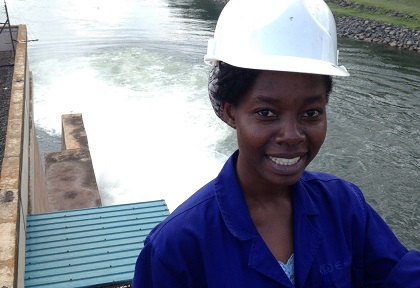
But to understand how she got to this point, we have to go back. She started her engineering career at Nabisunsa Girls School in Kampala, Uganda. Upon graduating high school - and excelling at science - she decided to pursue tertiary, joining Makerere University for a four-year Bachelor of Science in Electrical Engineering course.
Upon graduating, Mildred decided that she would acquire her Master of Engineering (Industrial Automation) from the Engineering Institute of Technology.
"I am grateful for EUL for having sponsored my Master's course. I have gained a lot of knowledge from the lecturers and the group of experienced classmates. This has boosted my performance at work as I have gained a global view of the automation sector, and I am now better placed to make technical decisions in my day to day work.”
Mildred chose to work in the industry due to her admiration for power generation for Uganda. She notes that the hydropower sector, and specifically at the power stations she works in, provide the nation with 40% of its power.
"I had always wanted to be part of a team, contributing to the power sector. Given the small number of ladies in the sector, I was motivated to join the male-dominated field to make my contribution toward national development.”
Mildred is aptly keeping her skills relevant to the industry due to the level of automation making its way into the industry. She is the system and maintenance engineer, working with the instrumentation in the two power stations. She is in charge of planning system life, purchasing required spares, developing maintenance strategies, carrying out required modifications and looking through the thermal-graphic surveys of plant equipment. Highly customized software are flooding into the power stations to aptly manage the infrastructure that gives Ugandans their power.
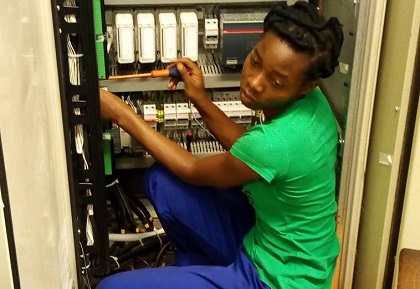
With a demanding job in the industry, and no time to go to a formal brick-and-mortar class, Mildred was happy to find EIT:
“It allowed me to gain knowledge in the most flexible way possible for a busy full-time employee. I was able to study without my employer feeling my absence. My class had experienced students in the automation field who could share real work experiences.”
Mildred notes that the modules covered in EIT’s coursework helped her at her workplace as she was busy with working on an upgrade project for one of the power stations’ distributed control system. She said:
“The technical modules, especially those related to communication, distributed control system and instruments, are very handy for my day to day maintenance and current upgrade projects of the distributed control system and instrumentation systems. I better understand the hydraulic circuits, thus can easily design control systems for them.”
In the next two years, Mildred intends to continue working in the control and instrumentation field but is looking forward to joining the management level in the years to come. In short, she's dedicated to working but is also ready to become a boss lady.
Cameron Russell Bourne is an engineering and technical specialist with a background in Energy, Oil & Gas and Heavy Marine industries. He is currently employed at Synergy, a large energy supplier in Western Australia as a Mechanical Technician.
His day-to-day responsibilities at Synergy see him presiding over a plethora of systems. He says:
“I perform a wide range of tasks including inspection; fault diagnosis, investigations, condition monitoring, reliability testing, balancing, commissioning, and providing analytic reporting services for plants & systems used in large thermal power-generation processes. These systems include boiler, turbine, auxiliary plants, pumps, high-grade steam, pressure equipment, mobile plants, and fire, raw water and reverse osmosis systems.”
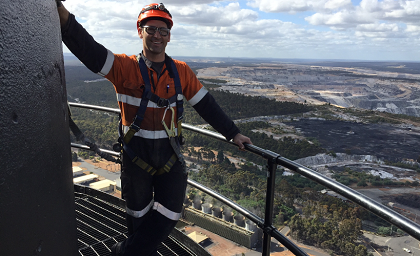
Cameron enrolled in and graduated through the Advanced Diploma of Mechanical Engineering Technologies with the Engineering Institute of Technology. He was a runner-up for the Graduate of the Year 2018, as announced at EIT’s Australian graduation.
Not only does he assist in the Oil & Gas industry, but he is also dedicated to the Emergency Response industry, and is a firefighting and emergency operations specialist too. How did Cameron manage to juggle all of these industries and manage to study at the same time? He chalks it up to EIT’s online delivery. He says:
“The online delivery of this course via the webinars and web page correspondence was the only way possible for me to achieve this qualification without having to give up my country lifestyle and regional location — this education model suited me very well.”
But, it wasn’t all smooth sailing. Cameron found that he had to break some old habits to get through the course successfully — going from never having studied online to studying entirely online was a new experience for him. However, something that motivated him throughout the course was the character and approachability of the lecturers.
“They have great background knowledge and in most cases are up to date with the latest technologies relating to the content of any particular module. They were always ready for further discussion post webinars and responded to any email queries within a reasonable time frame.”
Applying what’s been learned
Cameron has leveled up from engineering tradesman to a technician role in his workplace, since pursuing his qualifications with EIT. He has no doubts that the high level of success he was able to achieve in his workplace is because of his professional development. He said:
“In the role that I currently work in, I am fortunate enough to be able to use all of the skills that I have learned over the past 18 months and my development as a Mechanical Technician has gone from strength to strength.”
Now, he says, his time management skills are far better than they used to be. He says he is also more prepared for working with multidisciplinary teams in his workplace and feels more confident that he can get things done. He concludes:
“Having a deeper understanding of how and why things work, means I have developed a greater knowledge of how to manage their associated risks. I have found that my skill set as an emergency services officer has also been enhanced, which has been beneficial not only for my employer but also for the community in which I live.”
Ian Shivraj Doolun is originally from the Indian Ocean island of Mauritius. He completed his Bachelor of Engineering in Mechatronics with first class honors at Monash University. Upon obtaining his Bachelor of Engineering, he got offered a job at one of the best companies in automation and process control in Mauritius, where he worked for two and a half years as an Industrial Control Programmer.
Ian wanted to develop his career further and gain the cutting-edge automation knowledge needed as the Fourth Industrial Revolution continues to transform the engineering world. He decided to enroll in the Engineering Institute of Technology's Masters of Engineering (Industrial Automation). He reflected:
“I was surrounded by intelligent minds, and as a beginner I had to catch up quickly to integrate into the team and be able to provide efficient solutions. Doing the Masters course gave me a competitive advantage over my peers, both in terms of knowledge and chances of promotion.”
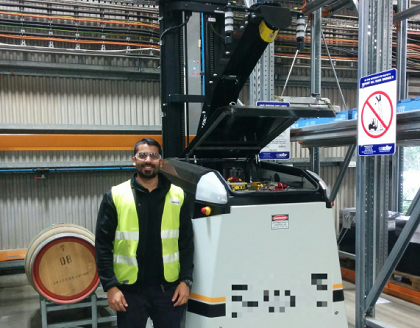
Ian then set his sights on Australia. Settling in Sydney, he is now working as an Automated Guided Vehicle (AGV) Project Engineer.
“The contents of the course aligned with my job. Some of the key modules that had a positive impact on my work were Programmable Logic Controllers; SCADA and Distributed Control Systems, and Industrial Process Control among others. I was also better at communicating my ideas, both technically and professionally. The course really stimulated my thinking process and enabled me to conduct my job more efficiently and effectively.”
Ian worked his way through the course so masterfully we are proud to recognize him as one of the finalists for EIT’s Graduate of the Year Award 2018. Ian did, however, learn the hard way in terms of simultaneously balancing work and his studies. But, eventually, a silver lining manifested. He said:
“The biggest challenge, at first, was the work-study balance in terms of time and dedication, but after the first couple of semesters, I got used to it. The assignments were also very challenging in some cases, but this allowed me to be more independent and enhance my research skills. The master’s thesis was also very strict in terms of schedule.”
Ian said through doing the course, he better understood industrial concepts and implementation strategies in the automation world. He concluded:
“I definitely applied what I learned to my work. My output at work improved tremendously.”
He is also about to take his Certified Associate in Project Management exam at the Project Management Institute, to further qualify him in his field. He said:
“I strongly believe that my strength resides in project management since I have very strong people and communication skills. However, I am always keen to enhance my knowledge of automation and other innovative topics.”
Hassan Mwanjali is an Engineering Institute of Technology (EIT) graduate who acquired his Advanced Diploma of Applied Electrical Engineering. He is currently working at the Diplomatic Mission at the Embassy of Japan in Tanzania as a Maintenance Engineer.

“I oversee the satisfactory conduct of property services including but not limited to Embassy of Japan general maintenance, power systems, power generators installations, and maintenance, electrical installation works, air conditioning works, water pumps, and plumbing works.”
He found EIT advantageous because he could both retain his position at the Embassy and he could professionally develop his engineering skills.
He is trying to reach his goal of becoming a fully decorated electrical engineer. He reckons that the technological growth of power electronics in the industry is fascinatingly developing.
“The gained knowledge and skills from the Engineering Institute of Technology enhanced my workmanship to a great extent. They added to my practical experience and hence made me execute my duties with more simplicity, more confidence, more accuracy and more expeditiously.”
Hassan utilized his time after hours and on the weekend to study and train through EIT, working through the syllabus, continually being motivated to complete modules and get to the finish line. Next, he would like to pursue his Bachelor of Science of Electrical Engineering through EIT.
Petro Chisale is never in one place for too long -- he goes where his electrical and instrumentation expertise is required. He graduated from the Engineering Institute of Technology (EIT) with an Advanced Diploma of Electrical and Instrumentation (E&I) Engineering for Oil and Gas Facilities.
After high school, Petro attended Masvingo Polytechnic in Masvingo, Zimbabwe to do an electrical power engineering course. After he obtained his qualification, he became a class one journeyman electrician with an industrial attachment at the then Rio Tinto Renco Mine.
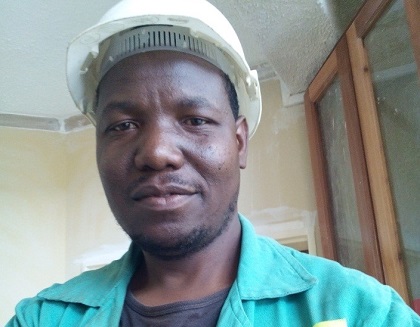
He later joined the National Oil Company as an electrician at the Beitbridge Oil Depot on the South Africa-Zimbabwe border. From there, he went into Harare to work as an assistant electrical technician before moving back to the border as a maintenance technician.
Currently, Petro is working at another oil terminal in Mutare on the border with Mozambique as a tank farm operator.
Every day he coordinates the receipts, storage, loading and transfer functions of quality cleared petroleum products. He produces all of the relevant reports for the management of the terminal. He also supervises assistant tank operators. The daily responsibilities of his roles include:
- Receiving products by road, rail and pipeline
- Plan for and clear petroleum products for loading in advance
- Monitor local and inter-depot transfers of petroleum products
- Accounting for all petroleum products
- Maintaining quality of the product in storage tanks
- Coordinating the suck back and spillage recovery programmes
- Tank farm security
- Supervision of subordinates
It sounds like quite a bit of work for one man to do, but Petro says the combination of interfacing with technology and field work is what he likes about the job. He said:
“I started my job at a remote oil terminal where there were no institutions to help improve myself through studying. I also found myself being transferred to different stations where I could not enroll or engage with conventional college setups. So, when I started online training, I discovered it was the best fit in my situation. As I moved from one oil terminal to the other, I would meet new technologies which coincidentally would be part of the program I studied.”
The fact that there is always something new to learn in the industry and to see new technologies getting implemented in it gives Petro the motivation he needs to keep going. He has already applied for the Bachelor of Science in Electrical Engineering with EIT.
We wish Petro all the very best in his challenging career and as he studies towards his Bachelor’s degree.
Gorataone is a graduate from the Engineering Institute of Technology; he has an Advanced Diploma of Industrial Automation. He is also a married man with three children; we congratulate him for ably juggling full time work, a family and his studies!
His career in the engineering world began at the Debswana Diamond mine in Botswana. While at the mine he became a control and instrumentation technician and, within the coal-fired plants, he worked with a 33MW pulverized boiler and 600MW fluidized circulating air boiler. His daily responsibilities included the calibration, troubleshooting and maintenance of process equipment. Naturally he was also involved in the safety of the plant at all times too.
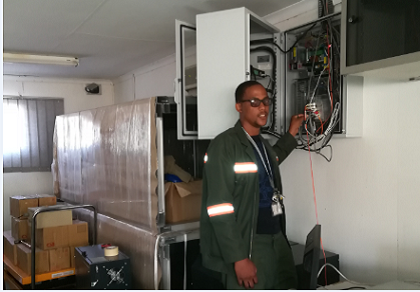
The qualification from EIT gave him the skills to progress in the mine: from working in the process control and instrumentation departments he has now moved to the access control and surveillance departments.
“The main reason I chose this course was to stay up to date with the ever-changing technology in this digital world,” Goratoane said.
He also noted that the convenience of studying after hours ensured he was able to cope with his busy and often conflicting schedule.
In his new role Goratoane’s duties include controlling the access to the various and colour-coded areas of the mine:
- White - the township area
- Green - the mine pit
- Red - recovery and sorting plants
Goratoane explained that these areas are under intense surveillance due to precious gemstones being mined. He also commented that the industry is seeing more and more integration with the Internet of Things and general automation.
“The most interesting development in the industry is the use of smart instruments which can be calibrated, diagnosed and operated remotely. The use of smart trucks at the mining pit is amazing as well - they even perform alcohol tests on the drivers, to check their fitness prior to driving; this protects the most valuable assets of the company.”
Gorataone mentions that he next wants to pursue qualifications in cyber security. The Engineering Institute of Technology has a Professional Certificate of Cybersecurity for Automation, Control, and SCADA Systems; a 6 week course. It equips students with the principles in digital security which can be applied to the infrastructure found in engineering industries.
In 2002, Fortunate Nyamidembo began pursuing a career in the engineering industry. By 2005, he had graduated with a National Certificate in Electrical Power Engineering and acquired a Trade Test Certificate.
He also obtained a Certificate of Compliance to become a Wireman License holder. Recently, he graduated with an Advanced Diploma of Applied Electrical Engineering through the Engineering Institute of Technology (EIT).
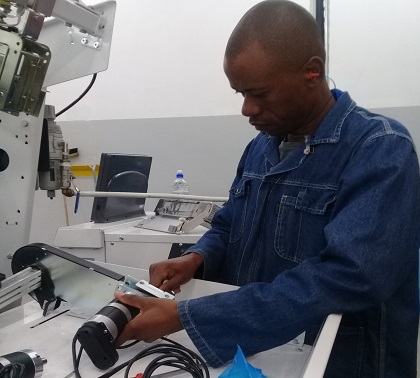
He has recently experienced a period of transition within his career: he has departed the textiles industry and moved onto engineering design and manufacturing in Road Tanker Manufacturing. Reflecting on his varied career thus far, he said:
“In my 13 year career, I have enjoyed the test of engineering in vast areas and got opportunities to collaborate with local and overseas technicians and engineers to tackle the job tasks. I worked for various sectors from textiles, manufacturing, steel processing, installation projects and even designing. Things I got involved with range from power, pneumatics, hydraulics, automation, electronics and instruments.”
Fortunate said he has been fascinated by watching industrial automation and processing creep into the engineering industry at almost every level. His everyday responsibilities include plant maintenance; responding to breakdowns, team leading, project designing, and upgrades.
He says EIT’s online training methods have enhanced his career and made him more confident in his ability to solve engineering problems in the workplace.
While working and studying simultaneously is a challenge, Fortunate said he was prepared to tackle it.
“I had to draw up a timetable that I forced myself to adhere to and cut unnecessary activities like watching television. Any TV I did watch was mainly engineering programmes like ‘Mega-Factories’ and ‘How it’s Made’.”
In his spare time, he conducts his own engineering experiments. He also plans to continue upskilling and acquiring qualifications — he wants to pursue either a Bachelor of Science (Industrial Automation Engineering) or a Bachelor of Science (Electrical Engineering) with EIT. Above all, Fortunate says he aims to continue implementing the knowledge and training he is gaining through his studies in his daily, hands-on job.
Oyama Khanyisile Vundla is a 24-year old young woman from a township named Madadeni in KwaZulu-Natal province in South Africa. She recently graduated from the Engineering Institute of Technology, acquiring an Advanced Diploma of Civil and Structural Engineering.
A middle child, Oyama has two brothers, but was raised by her grandmother after her mother died. She says that her grandmother was dubious about her wanting to become an engineer.
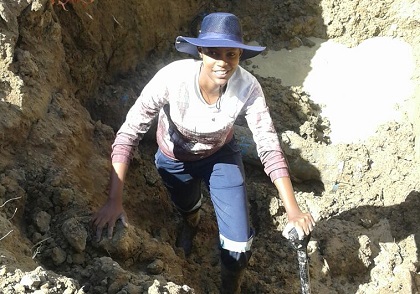
“She had her doubts that I would make it in an industry so dominated by men. Because of that, I had to work had and prove her wrong,” Oyama said.
Oyama graduated from high school in 2012, immediately enrolling in Civil Engineering studies at South West Gauteng College - a technical and vocational training college.
“I have always had an interest in construction work, wanting to know how the buildings and structures are erected and assembled,” she said.
In the trenches
In 2015, whilst doing her N6 certificate, she got a call from Rand Water, offering her a Plumbing apprenticeship that would last three years. She jumped at the opportunity immediately after obtaining her N6. She found herself at the Newcastle Training Center doing theoretical training for Plumbing, but did not manage to get the 18 months work experience so did not graduate from the college.
In 2016, she did some digging and found the Engineering Institute of Technology. That wasn’t the only digging she did: she also managed to track down her estranged father and expressed her desires to become an Engineer. He promised to help out with the fees for her studies, impressed that she was pursuing something as technical as engineering. She began studying through EIT whilst completing her apprenticeship. She was off to the races.
“I started the course using my phone to attend and would go to the internet cafe for the writing and submission of my assignments,” she recalls.
Obstacles on the road to success
Soon after she began the course her father was retrenched and could not continue to pay her fees. This inevitably caused Oyama stress and her first thoughts were that she would have to pull out of the course. She began falling behind on the course work and her assignments. But her tenacity got the better of her; she was not to be beaten. She renewed her commitment to the course, and at the same time, began applying for bursaries.
The Department of Military Veterans in South Africa responded and awarded her with a bursary. Despite these good tidings she realised that she risked having to pay the bursary money back to Military Veterans if she failed her advanced diploma. With the added pressure of being a woman in a male-dominated industry, and with her grandmother’s doubts, Oyama had to rise to the occasion and pass against all odds.
“Nobody believed in me, it was very hard to fight this on my own because even the colleagues I worked with during the apprenticeship would ask how on earth I was going to make it in this men’s industry. I told them to ‘watch and learn’,” she feistily asserted.
A Star is Born
On the 18th of October 2018, Oyama attended the EIT Graduation Gala and received her Advanced Diploma in Civil and Structural Engineering. As her name was called, she triumphantly walked towards the stage, knowing she had achieved what seemed like the impossible. Oyama said she chalks all the success she’s had in her life up to the grace of God.
“I am preaching the words to other females out there, telling them that there is no boundary for us women - we can also make it no matter what. Have a will, have a desire, know what you want and stick to it and in so doing, nothing can stand in your way,” she concluded.
“As long as women know what they want and have got what it takes to stand up to all the pressure, there is absolutely nothing stopping us. Women can dominate in this industry as long as they are interested and eager. It is high time we change our states of mind and give it the best shot we have.”
David Beeson is a former metallurgical engineer who discovered a passion for process control, despite his initial misgivings when still an undergraduate student; he found it a difficult and confusing subject at university. Now he has a blossoming career in the field and ensures he stays abreast of changes in the industry by pursuing professional development.
In fact David has recently graduated from the Engineering Institute of Technology, with a Master of Engineering in Industrial Automation - big-time professional development!
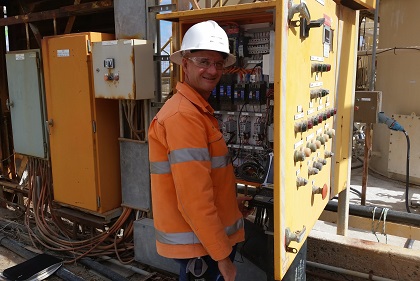
He provides a brief insight into the work he does:
"I am currently working as a process control engineer at a small but capable company that provides process control solution design, installation and commissioning services to the mineral processing industry."
David became familiar with furnaces and the molten metal as a metallurgical engineer, but is now more at home in freezing cold server rooms! Regardless, David observes that automation is the rising star across all engineering industries. This was his stimulus to pursue his Masters in Engineering (Industrial Automation), but the prospect of the thesis was daunting. He said:
"The thesis was both a highlight and a challenge. The highlight was having the opportunity to explore and understand what is actually involved in setting up an advanced control strategy, and the challenge was the research process – venturing into the unknown with an uncertain outcome and a lot to do in a short time period."
He went on to comment about an early hurdle during the degree:
"Another challenge was one of the first subjects – Power Engineering. With no electrical background I got lost in the sine and cosine functions a few times, but overall it was a great subject – all about controlling something that you cannot see."
Now that David is a graduate, he is reflecting on the skills that he learned throughout his studies. He recently guided an electrician through the fault finding process when connecting cables between a drive and a PLC; he was very pleasantly surprised with how much he knew and how much he could help. He explains that he has gained amazing awareness of the technologies and processes of the automation world and now is more confidently working in the industry.
He also surprises himself. As time goes on, he stumbles onto challenges that he finds himself capable of solving, thanks to the practical skill building the master’s qualification equipped him with.
EIT + family = happiness
Doing his Masters of Industrial Automation also helped David become a ‘cooler dad’! He fondly reflects:
"More recently my daughter was doing binary as part of her digital technology subject in year 7. She started talking about ASCII and I thought, ‘I actually know what that is’, and was able to answer her many questions on the subject."
David is a husband and a father to two, and outside of work he loves stand-up paddle-boarding, woodwork and Brazilian Jiu-Jitsu. Congratulations to David – not only has he graduated from a challenging master’s degree, but was nominated a runner up for the 2018 Graduate of the Year.
